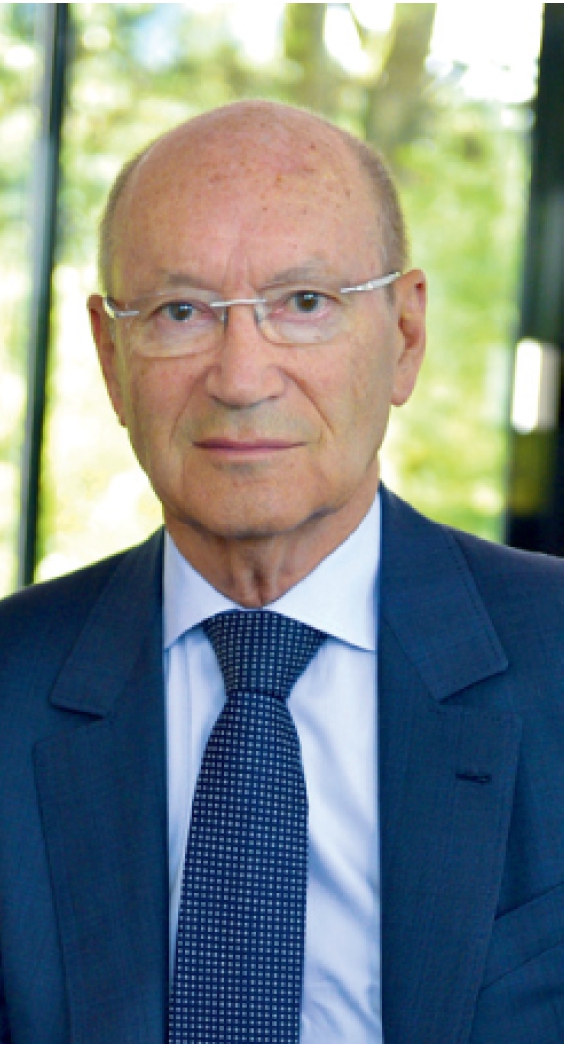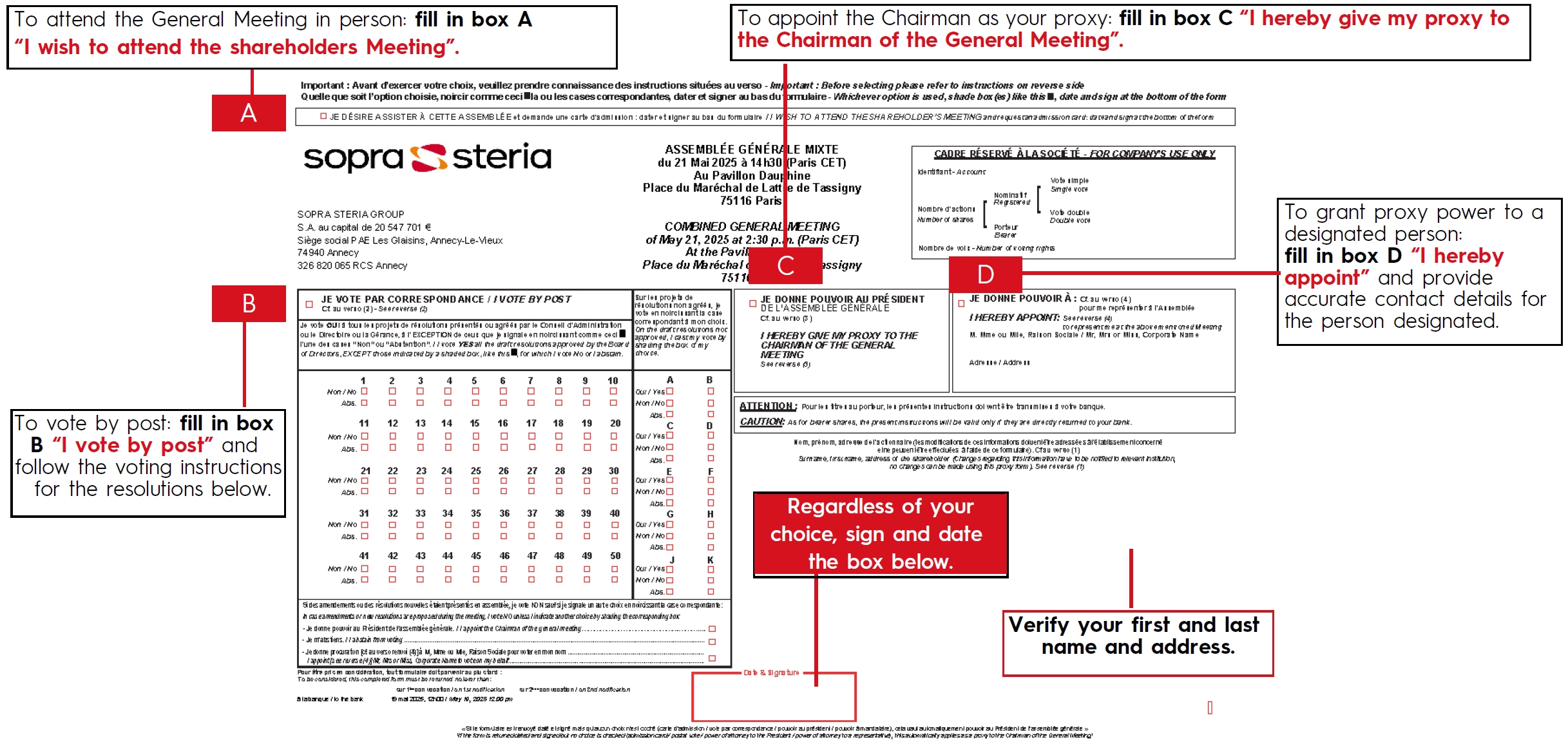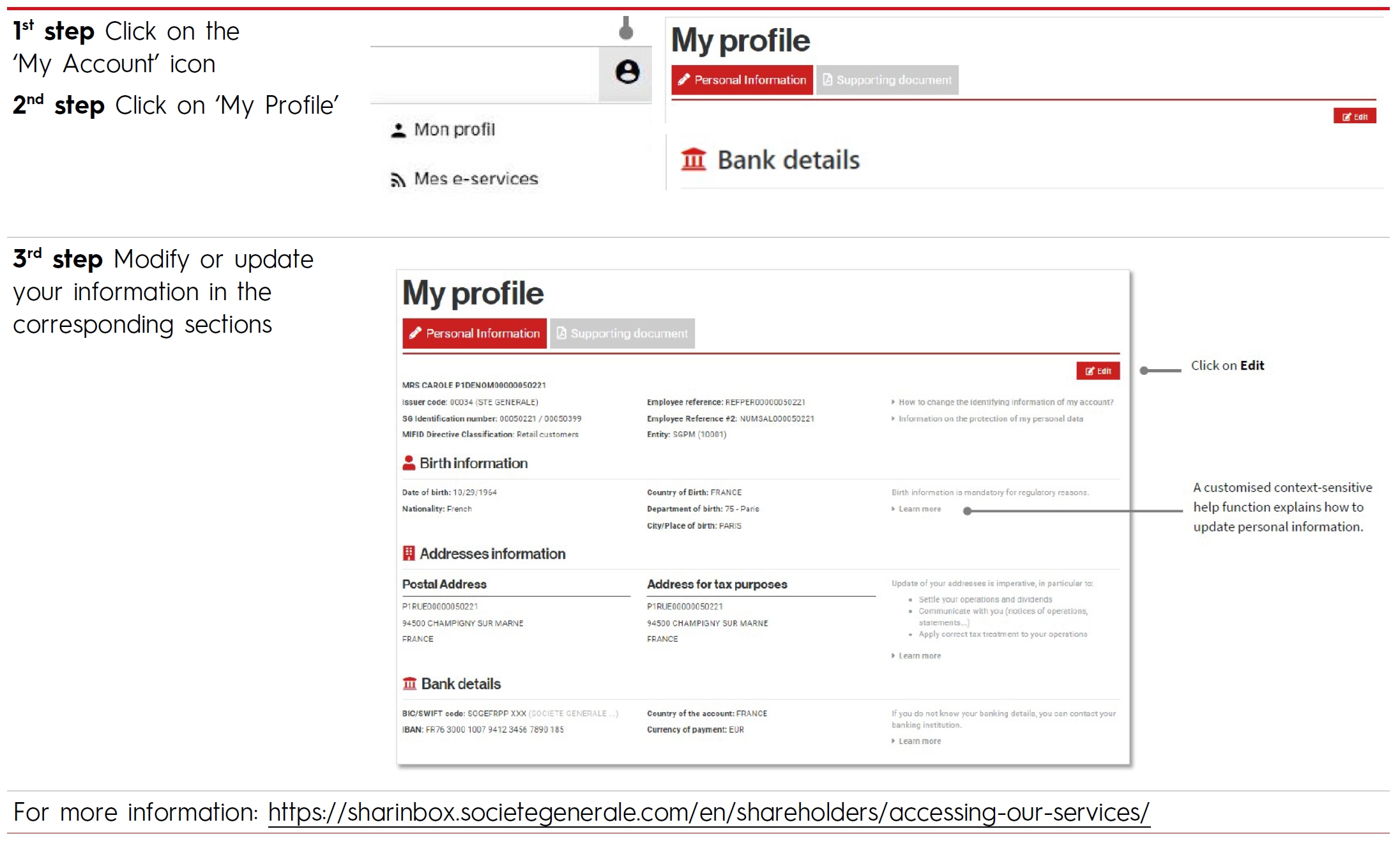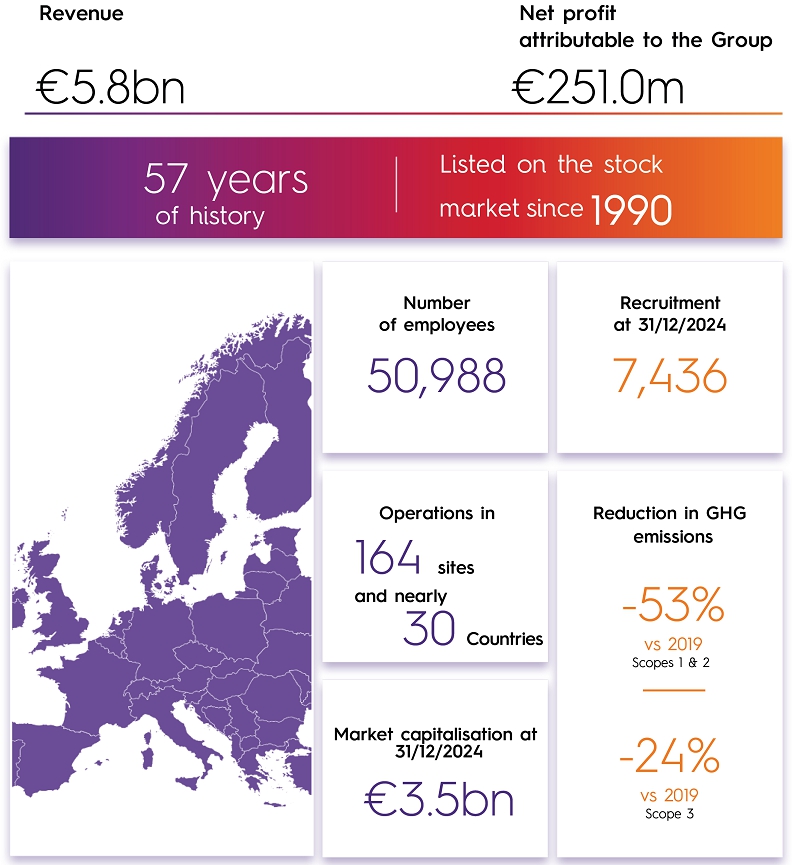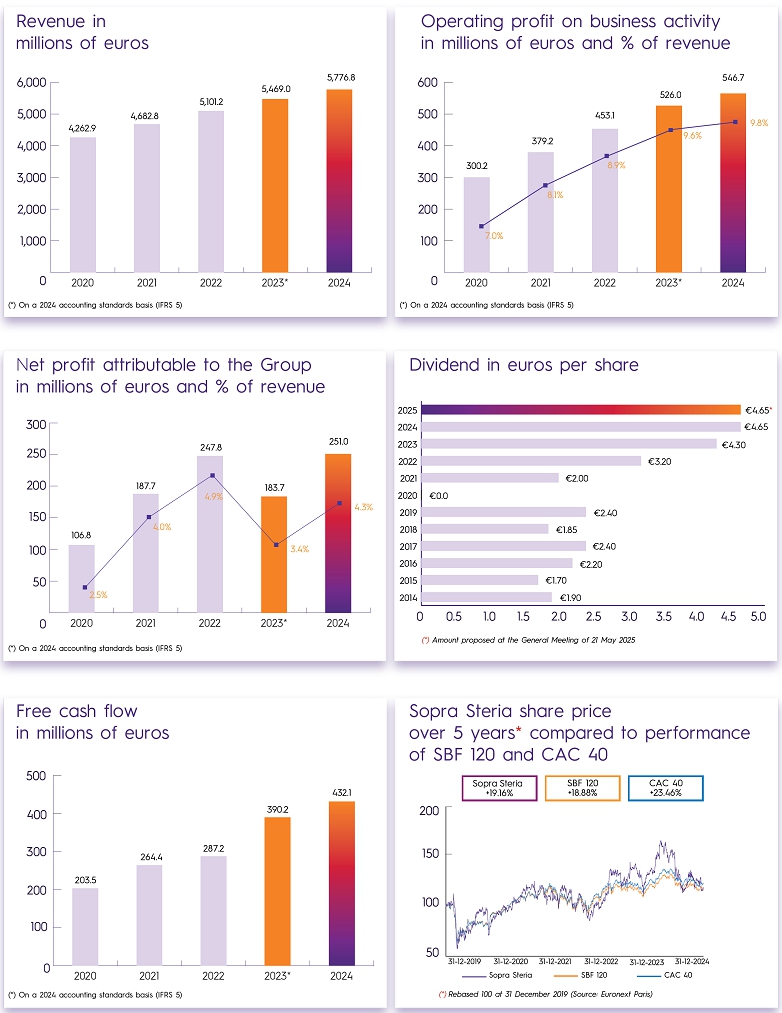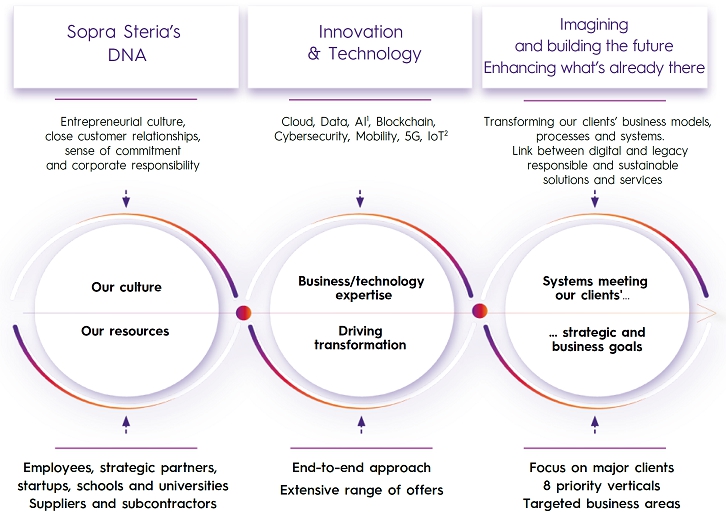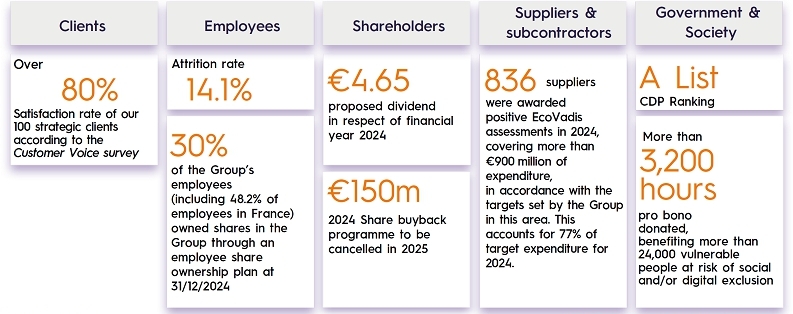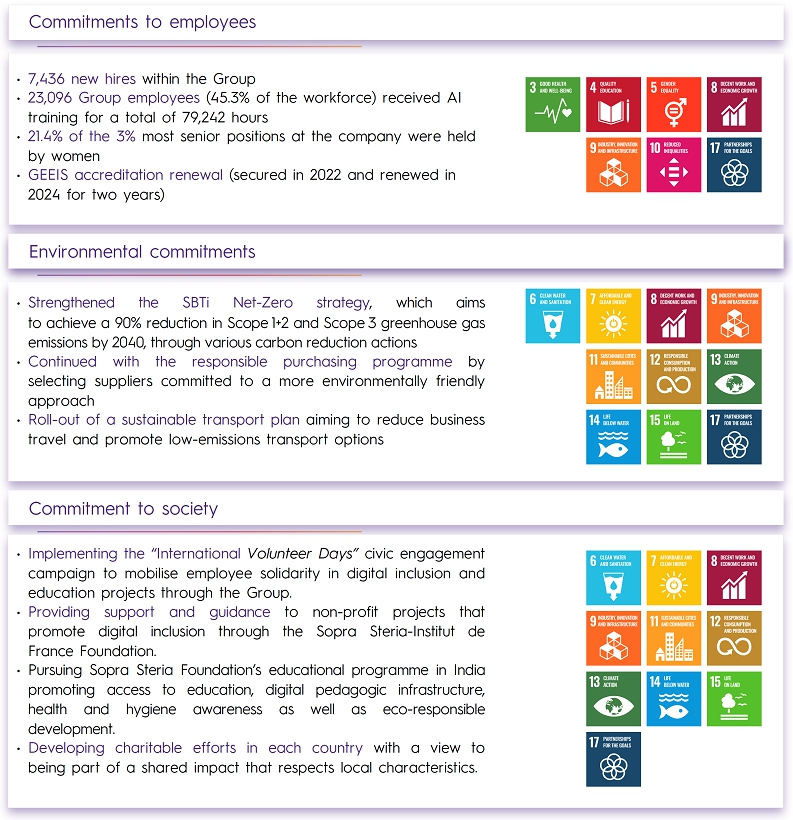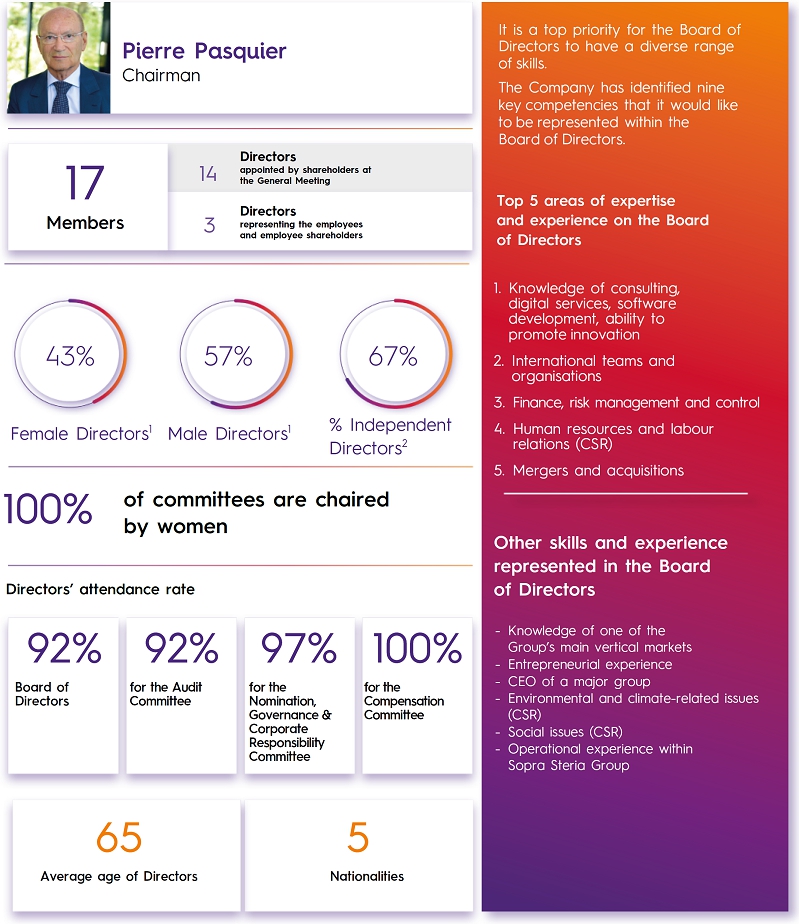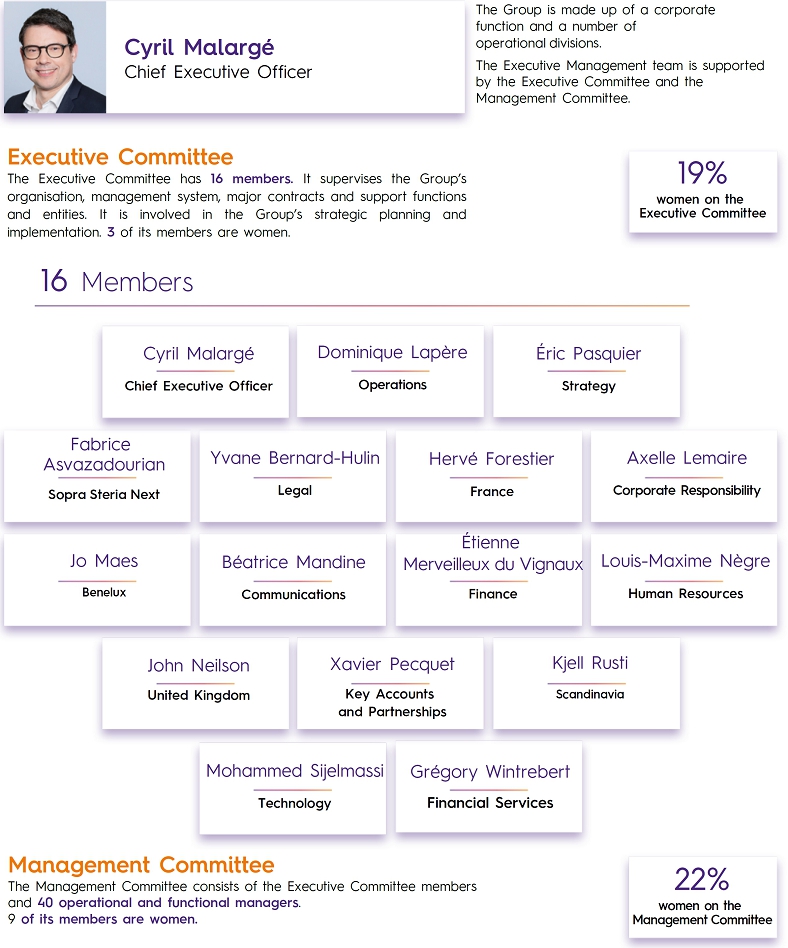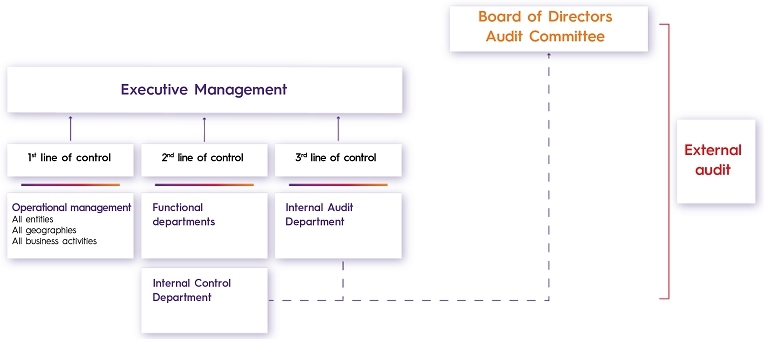BDC 2025
-
Chairman’s message
“ In the face of global operators, the Group has positioned itself as a trusted, credible European alternative”
Recent events have confirmed and amplified the profound upheavals that have been taking place for a number of years now: new political realities on the national and international stage, regional conflicts, technological acceleration, the energy transition… The result, in early 2025, is a particularly uncertain environment.
Against this backdrop, Sopra Steria is holding its course and rolling out its strategy. The Group has established itself as a European leader in consulting and digital services. In the face of global operators, it has positioned itself as a trusted, credible European alternative to help transform large organisations through technology and artificial intelligence.
In line with this strategy, in 2024 we decided to dispose of our banking software activities to refocus on consulting and digital services, and to unlock flexibility to invest in our transformation.
This transformation encompasses in particular our offers, our operating model, and our managerial and human resources. In the medium term, our goal is to streamline our business model, reinforce our consulting capacity, and generate more than 60% of the Group’s revenue through digital and cognitive technologies.
We are convinced that, in a rapidly changing environment and an increasingly digital economy, technology is a powerful driver of resilience, performance and organisational transformation.
Artificial intelligence, which is rapidly ramping up, is an additional transformation vector. For Sopra Steria, AI has created a vast range of opportunities that we will seize, while taking an ethical, sovereign approach.
For the past several quarters, our market environment has appeared less buoyant. Despite the wait-and-see attitude that has prevailed in a number of sectors, Sopra Steria showed resilience in 2024. Revenue held relatively steady (down slightly [0.5%]), operating performance was solid (with an operating margin of around 10%, up 0.4 percentage points from 2023), and debt levels were brought down nearly 60% (to around 19% of equity).
Backed by this healthy, robust position, we are determined to step up the pace of the Group’s transformation in 2025 to pursue our ambitious corporate plan.
-
1. Agenda and fomalities governing participation in the General Meeting
1. Agenda
The shareholders of Sopra Steria Group are invited to attend the Combined General Meeting to be held on Wednesday, 21 May 2025, at 2:30 p.m., at Pavillon Dauphine, Place du Maréchal de Lattre de Tassigny, 75116 Paris (France), to vote on the following agenda.
1.1. Item on the agenda without a resolution subject to a vote by the shareholders
-
2. Procedures governing participation in the General Meeting
2.1. Participation in the General Meeting
Sopra Steria Group’s share capital is made up of 20,547,701 shares. Double voting rights are allocated to all fully paid-up shares that are proved to have been registered in the name of the same shareholder for at least two years.
Every shareholder has the right to participate in the General Meeting, regardless of the number of shares held.
In accordance with Article R. 22-10-28 of the French Commercial Code, the only shareholders allowed to take part in the General Meeting or to be represented by proxy are those able to prove their status by showing that their shares are held in accounts in their name, or in the name of their authorised financial intermediary, no later than the second business day preceding the General Meeting, i.e. by Monday, 19 May 2025 at 0.00 a.m. (Paris time):
- for holders of directly registered (nominatif pur) or intermediary-registered (nominatif administré) shares: in registered share accounts;
- for holders of bearer shares: in bearer share accounts kept by the authorised intermediary responsible for managing the account, the Securities Account Holder.
Any shareholder who has already submitted their remote voting and proxy form (the Combined Form) may sell all or a portion of their shares up to the date of the General Meeting.
However, only sales completed before the second business day preceding the General Meeting, i.e. before Monday, 19 May 2025 at 0.00 a.m. (Paris time), will be taken into consideration. Only in such cases, the Securities Account Holder is required to send notification of the sale and provide the information necessary to cancel the vote or to change the number of shares and votes corresponding to the vote.
No share transfers completed after the second business day preceding the General Meeting, i.e. after Monday, 19 May 2025 at 0.00 a.m. (Paris time), irrespective of the means employed, are to be taken into consideration, notwithstanding any agreement to the contrary.
Société Générale Securities Services is the centralising agent for the General Meeting. Requests submitted by post to the centralising agent must be addressed to Société Générale Securities Services – Service des Assemblées, CS 30812, 44308 Nantes CEDEX 3 (France).
Shareholders who are able to do so are encouraged to give priority to the use of the secure Votaccess platform. This platform allows them to quickly and securely select their means of participation in the General Meeting.
The secure Votaccess platform will be open from Friday, 2 May 2025 at 9.00 a.m to Tuesday, 20 May 2025 at 3.00 p.m. (Paris time).
Holders of directly registered or intermediary-registered shares will need to sign in to the https://sharinbox.societegenerale.com website, then click on the “Replay” button in the “General Meeting” box on the homepage, and finally click on “Participe” to access the secure Votaccess platform.
- Holders of directly registered shares will need to use their usual access code to activate their Sharinbox By SG Markets account. On the Sharinbox welcome page, shareholders will find all information necessary to guide them through the process. If the shareholder has already activated their account using their email address as their username, their access code is not required, and they can use this email address to log in. Shareholders will have received their password by post when opening their registered account with Société Générale, or by post over the past few days. If this has not yet been done, shareholders activate their account so as to benefit from the latest version of authentication.
If a shareholder losses or forgets their password, they follow the procedure online on the authentication page.
- Holders of intermediary-registered shares will need to log in using the access code and password provided for this purpose by Société Générale Securities Services.
- Holders of bearer shares will need to log in to their Securities Account Holder’s website, using their usual access code and password, then access the secure Votaccess platform by following the on-screen instructions. Holders of bearer shares are recommended to contact their Securities Account Holder to find out whether access to this service is subject to any specific terms and conditions of use.
Shareholders are encouraged to log in to the secure Votaccess platform as soon as it opens, and in any event before the day before the General Meeting.
- attending the General Meeting in person;
- voting remotely prior to the General Meeting;
- appointing as their proxy:
- the Chairman (or if a shareholder does not name a proxy holder in a proxy form submitted to the Company), it being specified that in such a case, the Chairman of the General Meeting shall vote in favour of proposed resolutions submitted for approval by the Board of Directors, and against any other proposed resolutions,
- another shareholder, their spouse, the partner with whom they have entered into a pacte civil de solidarité (PACS, the French civil union contract), or any other individual or legal entity of their choosing under the conditions set out in Articles L. 225-106 and L. 22-10-39 of the French Commercial Code.
Pursuant to Article R. 22-10-28 III of the French Commercial Code, all shareholders who, having requested their admission card, have voted remotely or appointed a proxy, may no longer opt for any other means of participation.
Shareholders who wish to attend the General Meeting in person must bring proof of their identity and their admission card.
Shareholders may request an admission card online on the secure Votaccess platform by following the on-screen instructions after having logged in as described above in Section B. “Means of participation in the General Meeting”/ “Centralisation of the General Meeting – Use of the secure Votaccess platform”.
- Holders of directly registered or intermediary-registered shares must ensure their request for an admission card is received before 19 May 2025 at 12.00 noon (Paris time) by Société Générale Securities Services, using the Combined Form and the prepaid envelope attached to the notice of meeting.
- Holders of bearer shares must ask their Securities Account Holder to send them an admission card. Société Générale Securities Services must receive all requests by the Securities Account Holder no later than 19 May 2025 at 12.00 noon (Paris time). If, despite having submitted a request, holders of bearer shares have not received their admission card by 19 May 2025, they must ask their Securities Account Holder to provide them with a certificate of investment, which will allow them to prove their status as a shareholder to be admitted to the General Meeting.
Shareholders who arrive on the date of the General Meeting without an admission card or a certificate of investment are responsible for contacting their Securities Account Holder and requesting to be sent the certificate of investment required to attend the General Meeting.
On the day of the General Meeting, the certificate of investment shall be accepted either in print or electronic format, provided that, for the latter format, the shareholder is able to send it to the email address that will be provided upon arrival at the venue.
Shareholders may submit their voting instructions online on the secure Votaccess platform by following the on-screen instructions after having logged in as described above in Section B. “Means of participation in the General Meeting”/ “Centralisation of the General Meeting – Use of the secure Votaccess platform”.
- Registered shareholders must fill out and sign the Combined Form attached to the notice of meeting and send it back using the prepaid envelope to Société Générale Securities Services.
- Holders of bearer shares must: 1) ask their Securities Account Holder to send them the Combined Form; 2) send the completed signed Combined Form together with their voting instructions to their Securities Account Holder. The Securities Account Holder is responsible for sending the Combined Form, together with a certificate of investment, directly to Société Générale Securities Services – Service des Assemblées, CS 30812, 44308 Nantes CEDEX 3 (France).
In order to be taken into account, Combined Forms must be received by Société Générale Securities Services no later than Monday, 19 May 2025 at 12.00 noon (Paris time).
Shareholders may appoint a proxy or rescind a proxy appointment online on the secure Votaccess platform by following the on-screen instructions after having logged in as described above in Section B. “Means of participation in the General Meeting”/“Centralisation of the General Meeting – Use of the secure Votaccess platform”.
If and only if their Account Holder has not joined the Votaccess system, holders of bearer shares can send an email to the following address: assembleegenerale@soprasteria.com. The message must specify the full name and address of the principal shareholder, as well as those of the proxy appointed or whose appointment is rescinded. Holders of bearer shares must ask their Securities Account Holder to send Société Générale Securities Services a certificate of investment to prove their status as a shareholder.
-
3. Instructions for filling out the voting form
- To vote by post: fill in box B [I am voting by post], each numbered box corresponding to the draft resolutions presented by the Board of Directors and appearing in the notice of meeting. Then complete as follows:
- to vote “FOR”, leave the boxes empty;
- to vote “AGAINST” on any of these proposed resolutions, fill in the individual boxes corresponding to the resolutions;
- to vote “ABSTAIN” on any of these proposed resolutions, fill in the individual boxes corresponding to the resolutions.
Any shareholder may be represented by his or her spouse, the partner with whom he or she has entered into a pacte civil de solidarité (PACS, the French civil union contract), another shareholder or any other private individual or legal entity of his or her choice.
-
Request for documents and informations

COMBINED GENERAL MEETING OF
SHAREHOLDERSWednesday 21st May 2025 at 2:30 PM
Pursuant to Article R. 225-88 of the French Commercial Code, from the time that notice of a General Meeting is given until the fifth day (inclusive) before the meeting, any shareholder (owning registered shares or showing proof of ownership of bearer shares) may use the form below to ask the Company to send the documents and information described in Articles R. 225-81 and 83 of said Commercial Code.

Send this form to:
SOPRA STERIA GROUP For the attention of Lima Abdellaoui
Or by postal mail:
6 Avenue Kleber, 75116 PARIS
Or by email at:
lima.abdellaoui@soprasteria.com
requests to have sent to the address above the documents and information described in Articles R. 225-81 and 83 of the French Commercial Code, with the exception of those that were attached to the postal voting / proxy form.
Registered shareholders may send a single request to have the Company send the documents and information described above for each subsequent General Meeting. The same right is accorded to all holders of bearer shares who can prove their ownership by submitting a deposit certificate for a securities account in the name of the shareholder (attestation d’inscription en compte) kept by an intermediary, as set out in Article L. 211-3 of the French Monetary and Financial Code.
-
2. Sopra Steria Group’s presentation
1. Activities and strategy
1.1. Key figures
-
2. Financial performance
2.1. 2024 Full-year results
“Sopra Steria proved resilient in 2024 even as market conditions deteriorated, particularly in the fourth quarter. Group revenue held up well thanks to our business strategy focused on our top 100 strategic clients, which enabled us to renew a significant number of major contracts and extend some of our positions.
Against this backdrop, we delivered robust operating performance. We achieved the target we set three years ago of delivering an operating margin on business activity of around 10%, free cash flow exceeded 7% of revenue and the return on capital employed before tax rose to 21.5%.
We also reaffirmed our strategy over the course of the year. Sopra Steria is keen to establish itself as a European leader in consulting and digital services and position itself as a trusted, credible European alternative to global operators. This positioning is aimed at harnessing technology and artificial intelligence to help major public and private sector organisations navigate transformation.
The company’s transformation in support of this goal is already underway. It encompasses our offerings, our operating model, human resources and industrialisation and includes an external growth component. In 2024, the shift from a service-based approach to high value-added offers translated in particular into the creation of two cross-functional service lines: Digital Platform Services, representing revenue of over €600 million, and Cybersecurity, representing revenue of over €200 million. A Group Chief Operating Officer was appointed to accelerate the evolution of our operating model. In human resources, we increased our experts’ technology certifications by 32% and trained all our employees in artificial intelligence. Lastly, all the Group’s developers now have access to development platforms augmented by generative AI agents.
Faced with an uncertain environment in this early part of 2025, we are determined to drive the Group’s transformation to generate more value for our clients, more opportunities for our employees and more performance for our shareholders..”
Consolidated revenue totalled €5,776.8 million, down a modest 0.5% compared with the reported 2023 figure. Changes in scope had a €15.7 million negative impact. Acquisitions added €320.6 million of revenue (CS Group, Tobania, and Ordina after adjusting to exclude “agent” revenue totalling -€82 million over 12 months(1)). The sale of the Sopra Banking Software business reduced revenue by €336.3 million. Currency fluctuations had a positive impact of €18.1 million. At constant scope and exchange rates, revenue growth was -0.5%.
Operating profit on business activity came to €564.7 million, up 3.0% relative to 2023. This gives an operating margin on business activity of 9.8%, up 0.4 percentage points, thus achieving the target set three years ago (target for 2024 set in 2022: “Operating margin on business activity of around 10%”).
In France (42% of the Group total), revenue came in at €2,437.9 million, equating to negative organic growth of 1.6%. Revenue declined 2.0% in the fourth quarter. It was hit by a sharp slowdown in the aeronautics sector, where quarterly volumes are thought to have reached a low point. Excluding aeronautics, the reporting unit’s revenue held more or less steady in the fourth quarter (up 0.5%). Over the full year, sector trends were positive in defence and the public sector. Other sectors lost ground. The reporting unit’s operating margin on business activity came out at 9.0% (9.6% in 2023), mainly as a result of the decline in activity in the aeronautics sector. Meanwhile, CS Group confirmed a 1.9-point uplift in its profitability compared with 2023.
Revenue for the United Kingdom (17% of the Group total) was €962.1 million, down 0.5%. Revenue was down 9.4% in the fourth quarter. This change mainly arose from a particularly high basis of comparison for the SSCL platform (which saw 25.2% growth in Q4 2023). It also reflects the completion of a major contract, while another major contract, originally scheduled for the fourth quarter, was pushed back to the beginning of the second quarter of 2025. Overall, across the full year, the public sector contracted while the private sector posted strong growth. The reporting unit’s operating margin on business activity improved by 1.1 points to 12.1%.
In Europe (35% of the Group total), revenue grew 0.5% on an organic basis to €2,049.0 million. The most buoyant growth was in Scandinavia, Spain and Italy, where revenue grew by between 8% and 10%. Other countries saw revenue decline by between 3% and 5%. The reporting unit’s operating margin on business activity was 9.1%, up 0.4 points from 2023.
The Solutions reporting unit (6% of the Group total) posted revenue of €327.8 million, representing organic growth of 1.1%. Human Resources Solutions posted growth of 3.6%. Property Management Solutions contracted by 1.7%. Excluding the impact of changes in scope (reallocation of business previously within the scope of SBS following its disposal), the reporting unit’s operating margin on business activity improved by 1.6 percentage points compared with 2023.
- Recognition of revenue generated by Ordina through the sale of external expertise was harmonised with effect from 1 January 2024. This revenue is recognised on a net basis where it meets the IFRS 15 definition of revenue generated by an agent.
Profit from recurring operations came in at €514.9 million, equating to growth of 10.2%. It included a €17.3 million share-based payment expense (versus €43.0 million in 2023) and a €32.5 million amortisation expense on allocated intangible assets (versus €38.0 million in 2023).
Operating profit came in at €460.3 million, up 39.5%, after a net expense of €54.7 million for Other operating income and expenses (compared with a net expense of €137.4 million in 2023), which included a capital gain of €11.1 million, not allocated to any reporting unit, in connection with the disposal of 74Software shares(1).
The tax expense totalled €96.8 million, for an effective tax rate of 23.0%. Restated for non-recurring items, the normative tax rate was 26%.
Net profit/loss from associates amounted to a loss of €6.7 million (compared with €6.7 million in 2023).
Net profit attributable to the Group from continuing operations came in at €309.3 million, up 68.4%, giving a margin of 5.4%.
Consolidated net profit came in at €259.9 million, up 37.5%, and net profit attributable to the Group came to €251.0 million, up 36.6%, after deducting €9.0 million attributable to non-controlling interests.
Free cash flow was very strong, at €432.1 million (compared with €390.2 million in 2023). This reflects a 3.6% increase in EBITDA and includes exceptional net cash flow of around €45 million linked to the scheduled conclusion of a major migration programme in Germany.
Net financial debt totalled €382.2 million, down 59.6% from its level at 31 December 2023. At that date, it was equal to 19.3% of equity and 0.61x pro forma EBITDA for 2024 before the impact of IFRS 16 (with the financial covenant stipulating a maximum of 3x).
The €150 million share buyback programme launched on 2 October 2024 concluded on 28 January 2025. During the share buyback period, which ran from 2 October 2024 to 28 January 2025, Sopra Steria bought back 858,163 shares (4.2% of capital) at an average price of €174.79 per share, for a total amount of €150 million. The shares bought back under this programme will be retired in 2025.
At the next General Meeting of Shareholders, to be held on Wednesday 21 May 2025, Sopra Steria will propose the payment of a dividend of €4.65 per share (vs. €4.65 per share in respect of financial year 2023). The ex-dividend date will be 3 June 2025. The dividend will be paid as of 5 June 2025.
At end-December 2024, the Group’s net headcount came to 50,988(2) employees, compared with 51,768 employees at year-end 2023. Around 7,900 staff were employed at international service centres, unchanged at constant scope from 2023.
Sopra Steria sees its contribution to society as sustainable, human-focused and purposeful, guided by the firm belief that making digital solutions work for people is a source of opportunity and progress.
With regard to the environment, CDP(4) confirmed in February 2025 that Sopra Steria had made its A List – recognising the world’s most transparent and most proactive companies in the fight against climate change – for the 8th year in a row.
This recognition notably reflects the Group’s Net-Zero target(5) of achieving a 54% reduction in its greenhouse gas emissions from Scopes 1 & 2 and a 37.5% reduction for Scope 3 by 2030. As at end-December 2024, the Group had achieved a 52.7% reduction in Scope 1 & 2 emissions and a 23.9% reduction in Scope 3 emissions.
In the social arena, the proportion of women in the 3% most senior positions increased 1.3 percentage points in 2024 to 21.4%, while the proportion in the 10% most senior positions increased 0.8 points to 22.3%.
- Formerly “Axway”.
- Workforce excluding interns, in accordance with the requirements of the CSRD. Including interns, the workforce totalled 51,237 at 31 December 2024 and 52,041 at 31 December 2023.
- Attrition rate including top performers, who left less than six months after they were recruited, in accordance with the requirements of the CSRD.
- Every year, more than 24,800 companies and organisations around the world provide details on their environmental performance to CDP for independent assessment against its scoring methodology for the benefit of investors, purchasers and other stakeholders.
- Target approved by the Science Based Targets initiative (SBTi) on 16 June 2023 and aligned with the aim of limiting the increase in the average global temperature to 1.5°C Reduction targets versus 2019 baseline.
- Annual organic revenue growth of between 2% and 5%
- Operating margin on business activity of between 10% and 11%
- Free cash flow of between 5% and 7% of revenue
- Return on capital employed (RoCE) before tax of around 20%
The European market is expected to remain unfavourable in the first half of the year as a result of a still uncertain climate, particularly in France.
- Organic revenue growth of between -2.5% and +0.5% Revenue is expected to bottom out in the first quarter, down by between 5% and 6%;
- Operating margin on business activity of between 9.3% and 9.8%, including a dilutive effect of around 0.3 points arising from increases in employers’ payroll contributions enacted by the UK and French governments for 2025
- Free cash flow of between 5% and 7% of revenue
The sale of Sopra Banking Software, announced on 21 February 2024 as part of Sopra Steria’s process of refocusing its activities on digital services and solutions, was finalised on 2 September 2024. The activities sold were recognised in discontinued operations (in accordance with IFRS 5) with effect from the financial statements for the first half of 2024.
The total amount received by Sopra Steria in 2024 in connection with the refocusing of its activities (sale of SBS, sale of 16.7% of 74Software and sale of 74Software subscription rights in connection with the latter’s capital increase) was €410.6 million. Sopra Steria retains an 11.1% stake in 74Software’s share capital.
In 2024, €43.5 million was invested in infrastructure and technical facilities, compared with €54.1 million in 2023.
- land and buildings: €0.2m (€0.1m);
- fixtures, fittings and furniture: €20.4m (€36.3m);
- IT: €22.9m (€17.7m).
(in millions of euros) Notes Financial
year 2024Financial
year 2023Revenue 4.1 5,776.8 5,469.0 Staff costs 5.1 -3,611.7 -3,345.4 External expenses and purchases 4.2.1 -1,387.3 -1,419.0 Taxes and duties -42.8 -39.4 Depreciation, amortisation, provisions and impairment -186.8 -165.7 Other current operating income and expenses 4.2.2 16.5 26.5 Operating profit on business activity 564.7 526.0 as % of revenue 9.8% 9.6% Expenses related to stock options and related items 5.4 -17.3 -34.3 Amortisation of allocated intangible assets 8.2 -32.5 -28.9 Profit from recurring operations 514.9 462.8 as % of revenue 8.9% 8.5% Other operating income and expenses 4.2.3 -54.7 -78.5 Operating profit 460.3 384.3 as % of revenue 8.0% 7.0% Cost of net financial debt 12.1.1 -35.4 -19.5 Other financial income and expenses 12.1.2 -3.2 6.1 Tax expense 6.1 -96.8 -114.2 Net profit from associates 10.1 -6.7 6.7 Net profit from continuing operations 318.2 263.5 Net profit from discontinued operations 2.2 -58.3 -74.4 Consolidated net profit 259.9 189.1 as % of revenue 4.5% 3.5% Non-controlling interests 14.1.5 9.0 5.4 NET PROFIT ATTRIBUTABLE TO THE GROUP 251.0 183.7 as % of revenue 4.3% 3.4% EARNINGS PER SHARE (IN EUROS) NOTES Basic earnings per share 14.2 12.46 9.08 Diluted earnings per share 14.2 12.34 8.94 Basic earnings per share from continuing operations 14.2 15.36 12.76 Diluted earnings per share from continuing operations 14.2 15.21 12.56 Basic earnings per share from discontinued operations 14.2 -2.90 -3.68 Diluted earnings per share from discontinued operations 14.2 -2.87 -3.62 The sale of Sopra Banking Software was preceded in the first half of the year by the legal carve-out of those activities of Sopra Banking Software to be sold and the transfer to Group entities of those activities to be retained (see Note 2.2).. As such, the “France” reporting unit now includes software integration activities. The “Other Europe” reporting unit now includes activities relating to a credit management solution in Belgium, solutions managed by the subsidiary previously held by Sopra Banking Software in Germany, and the service centre in Spain for projects included in the “France” reporting unit. Lastly, the activities of Sopra Solutions were combined and are now presented as part of the “Solutions” reporting unit. Segment figures for financial year 2023 were restated, in accordance with the requirements for classifying Sopra Banking Software as a discontinued operation. The Sopra Banking Software segment is no longer included in segment information. Lastly, the “Not allocated” segment is used to reconcile the Group’s operating profit and includes profit from the sale of Axway Software shares described in Note 2.2 for €11.1 million.
(in millions of euros) Financial year 2024 Financial year 2023 Revenue 2,437.9 2,426.3 Operating profit on business activity 220.4 9.0% 235.6 9.7% Profit from recurring operations 201.6 8.3% 207.7 8.6% Operating profit 182.1 7.5% 198.9 8.2% b. United Kingdom (in millions of euros) Financial year 2024 Financial year 2023 Revenue 962.1 940.9 Operating profit on business activity 116.9 12.1% 103.2 11.0% Profit from recurring operations 107.8 11.2% 89.4 9.5% Operating profit 100.7 10.5% 79.1 8.4% c. Europe (in millions of euros) Financial year 2024 Financial year 2023 Revenue 2,049.0 1,777.5 Operating profit on business activity 186.4 9.1% 151.7 8.5% Profit from recurring operations 165.7 8.1% 139.0 7.8% Operating profit 128.5 6.3% 105.0 5.9% d. Solutions (in millions of euros) Financial year 2024 Financial year 2023 Revenue 327.8 324.2 Operating profit on business activity 41.0 12.5% 35.4 10.9% Profit from recurring operations 39.9 12.2% 26.7 8.2% Operating profit 38.0 11.6% 1.4 0.4% e. Not allocated (in millions of euros) Financial year 2024 Financial year 2023 Revenue - - Operating profit on business activity - - Profit from recurring operations - - Operating profit 11.1 - f. Group (in millions of euros) Financial year 2024 Financial year 2023 Revenue 5,776.8 5,469.0 Operating profit on business activity 564.7 9.8% 526.0 9.6% Profit from recurring operations 514.9 8.9% 462.8 8.5% Operating profit 460.3 8.0% 384.3 7.0% ASSETS (in millions of euros) Notes 31/12/2024 31/12/2023 Goodwill 8.1 2,348.2 2,586.2 Intangible assets 8.2 238.5 322.6 Property, plant and equipment 8.3 148.7 164.6 Right-of-use assets 9.1 384.4 457.1 Equity-accounted investments 10.2 1.0 185.9 Other non-current assets 7.1 224.6 135.2 Retirement benefits and similar obligations 5.3 47.1 40.6 Deferred tax assets 6.3 115.1 184.1 Non-current assets 3,507.6 4,076.4 Trade receivables and related accounts 7.2 1,291.4 1,372.4 Other current assets 7.3 419.8 454.2 Cash and cash equivalents 12.2 423.4 191.7 Current assets 2,134.5 2,018.3 Assets held for sale 2.2 0.0 - TOTAL ASSETS 5,642.2 6,094.6 LIABILITIES AND EQUITY (in millions of euros) Notes 31/12/2024 31/12/2023 Share capital 20.5 20.5 Share premium 531.5 531.5 Consolidated reserves and other reserves 1,375.4 1,324.7 Equity attributable to the Group 1,927.4 1,876.7 Non-controlling interests 57.1 48.4 TOTAL EQUITY 14.1 1,984.5 1,925.1 Financial debt – Non-current portion 12.3 616.7 619.5 Lease liabilities – Non-current portion 9.2 322.1 392.9 Deferred tax liabilities 6.3 42.0 114.1 Retirement benefits and similar obligations 5.3 199.7 226.2 Non-current provisions 11.1 88.3 59.4 Other non-current liabilities 7.4 19.4 21.6 Non-current liabilities 1,288.3 1,433.6 Financial debt – Current portion 12.3 188.8 518.2 Lease liabilities – Current portion 9.2 105.1 110.0 Current provisions 11.1 36.8 53.9 Trade payables and related accounts 354.2 354.5 Other current liabilities 7.5 1,684.5 1,699.2 Current liabilities 2,369.4 2,735.9 Liabilities held for sale 2.2 -0.0 - TOTAL LIABILITIES 3,657.7 4,169.5 TOTAL LIABILITIES AND EQUITY 5,642.2 6,094.6 Alternative performance measures
- Restated revenue: Revenue for the prior year, expressed on the basis of the scope and exchange rates for the current year.
- Organic revenue growth: Increase in revenue between the period under review and restated revenue for the same period in the prior financial year.
- EBITDA: This measure, as defined in the Universal Registration Document, is equal to consolidated operating profit on business activity after adding back depreciation, amortisation and provisions included in operating profit on business activity.
- Free cash flow: Net cash from operating activities; less investments (net of disposals) in property, plant and equipment, and intangible assets; less lease payments; less net interest paid; and less additional contributions to address any deficits in defined-benefit pension plans.
- Operating profit on business activity: This measure, as defined in the Universal Registration Document, is equal to profit from recurring operations adjusted to exclude the share-based payment expense for stock options and free shares and charges to amortisation of allocated intangible assets.
- Profit from recurring operations: Operating profit before other operating income and expenses, which includes any particularly significant items of operating income and expense that are unusual, abnormal, infrequent or not foreseeable, presented separately in order to give a clearer picture of performance based on ordinary activities.
- Basic recurring earnings per share: This measure is equal to basic earnings per share before other operating income and expenses net of tax.
- Return on capital employed (RoCE): (Profit from recurring operations after tax + Profit from equity-accounted companies) / (Equity + Net financial debt).
- Downtime: Number of days between two contracts (excluding training, sick leave, other leave and pre-sales) divided by the total number of business days.
(in thousands of euros) 2024 2023 2022 2021 2020 Financial position at year-end ■ Share capital 20,548 20,548 20,548 20,548 20,548 ■ Number of shares issued 20,548 20,548 20,548 20,548 20,548 ■ Number of bonds convertible into shares 0 0 0 0 0 Results of operations for the year ■ Revenue excluding VAT 1,984,730 1,965,561 1,891,556 1,717,658 1,512,781 ■ Profit before tax, depreciation, amortisation and provisions -50,886 753,383 230,059 174,360 131,796 ■ Corporate income tax -16,567 -30,407 -16,032 -15,468 -20,835 ■ Profit after tax, depreciation, amortisation and provisions 176,642 31,709 167,666 156,867 142,276 ■ Amount of profit distributed as dividends 0 95,547 88,355 65,754 41,095 Earnings per share ■ Profit after tax but before depreciation, amortisation and provisions -1.67 38.14 11.98 9.24 7.43 ■ Profit after tax, depreciation, amortisation and provisions 8.60 1.54 8.16 7.63 6.92 Dividend paid per share 4.65 4.30 3.20 2.00 Employee data ■ Number of employees 13,377 13,438 13,336 13,236 12,997 ■ Total payroll 737,166 714,752 684,774 665,161 625,364 Amount paid in respect of employee benefits
(social security, employee discounts, etc.)343,682 348,989 317,064 300,241 277,481 -
3. Our mission, values and Sustainability Report
Technology serves as a gateway to infinite possibilities. As fascinating as this never-ending stream of innovations is, it also raises questions as to what is actually behind the frantic race for novelty and change.
Solutions are never straightforward or obvious, and there is certainly never just one way of doing things.
At Sopra Steria, our mission is to guide our clients, partners and employees towards bold choices to build a positive future by putting digital technology to work in service of humanity.
Beyond technology, we set great store by collective intelligence, in the firm belief it can help make the world a better place.
Together, we are building a highly promising future by delivering tangible benefits: sustainable solutions with positive impacts that take full account of interactions between digital technology and society. There’s still so much more we can achieve together.
At Sopra Steria, we strive to create a stimulating, group-oriented environment inspiring free thinkers to engage in open, frank discussions. Our goal is to foster the development of skills and entrepreneurship in a community driven by a desire for collective success.
“Sustainability and digital technology are intrinsically linked and must be used to drive responsible, lasting growth.” In 2024, we ramped up our social and environmental commitments and made notable progress in decarbonisation and diversity. The Corporate Sustainability Reporting Directive (CSRD) marks the next step in ensuring that our commitments are transparent. We will continue to innovate and mobilise our stakeholders to build a more peaceful and sustainable future.”
Sopra Steria conducted a double materiality assessment1, the outcome of which confirmed the Company’s priorities, some of them longstanding, while providing a fresh perspective on the value chain.
These priorities reflect Sopra Steria’s identity, strategy and business model, which are intrinsically linked to the quality of its relationships with its partners and the role of digital technology in society.
- Climate change adaptation (ESRS E1)
- Reducing and mitigating the carbon footprint (ESRS E1)
- Resource and waste management (ESRS E5)
- Priority placed on training and skills (ESRS S1)
- Equal opportunities and diversity (ESRS S1)
- Employee protection and trust (ESRS S1)
- Social dialogue (ESRS S1)
- Regional presence (ESRS S3)
- Contribution to essential public services (ESRS S4)
- Business conduct and compliance (ESRS G1)
- Cybersecurity and digital sovereignty
- Developing responsible digital technology
1_Analysis conducted in accordance with the requirements of the Corporate Sustainability Reporting Directive (CSRD)
Sopra Steria is fully committed to managing its corporate responsibility priorities to ensure that it delivers as a responsible corporate citizen and meets its stakeholders’ expectations. The results achieved are testament to the Group’s tangible commitment in relation to social, environmental and societal issues.
-
4. Governance
- _ 6/14 women – 8/14 men
- _ 10/14 Board members qualify as independent based on the AFEP-MEDEF Code’s requirements
On 19 June 2012, the Board of Directors decided to separate the roles of Chairman and Chief Executive Officer. It confirmed this decision in 2018, 2021 and again in 2024. It believes that this separation of roles remains the best way of addressing the Group’s strategic and operational priorities. Given the close relationship between the Chairman of the Board of Directors and the Chief Executive Officer, there is close collaboration and an ongoing dialogue between them. The current governance structure therefore helps streamline management of the Company. It means that the Group is able to act as quickly as needed and ensures decisions are taken with due care, while taking into account strategic priorities.
The Chairman is tasked with managing strategy, while the Chief Executive Officer is responsible for operations.
- guides the implementation of the Group’s strategy and all related matters, including mergers and acquisitions;
- assists Executive Management with the transformation of the Group;
- oversees investor relations and manages the Board’s relations with shareholders.
- works with the Chairman to formulate strategy;
- supervises the implementation of decisions adopted;
- ensures the operational management of all Group entities.
The Nomination, Governance & Corporate Responsibility Committee conducts an annual review of the succession plan for the Chairman of the Board of Directors and the Chief Executive Officer so any unforeseen vacancies can be dealt with appropriately. As part of this process, it meets with the Chairman of the Board of Directors. It makes sure the plan covers existing requirements and the Group’s culture. It assesses the relevance of any proposed changes. It debates action to be taken in the short and medium term in view of reappointments and expiring terms of office.
The Chairman of the Board of Directors carried out activities on a full-time basis throughout the year. This included overseeing the work of the Board and other assignments entrusted to him.
The Chairman’s assignments include the governance of strategy, acquisitions and the Board of Directors’ relations with shareholders. He is involved in several areas that are key to the Group’s future and transformation (HR, digital and industrial transformation; key organisational and operating principles; employee share ownership; promotion of Group values and compliance). This list of key matters is approved at the beginning of each year together with the Chief Executive Officer.
The Chairman is responsible for maintaining balance between the Group’s various stakeholders: shareholders, employees and the community. He ensures that the Group’s social and environmental priorities are properly taken into account.
In crisis situations, the ability to prioritise issues, uphold the Group’s values, and consider its options from a longer-term perspective thanks to the commitment provided by the core shareholder is absolutely critical.
The various matters placed under the Chairman’s responsibility require thorough knowledge of operational realities. Close relations with the Chief Executive Officer and the members of the Executive Committee facilitate information-sharing. It facilitates effective coordination on:
- decisions required for the implementation of the medium-term strategic plan and the Group’s transformation;
- monitoring of the implementation of such decisions over the long term.
- the roles defined in the internal rules and regulations of the Board of Directors;
- compliance with the respective prerogative powers of the Chairman of the Board of Directors and the Chief Executive Officer;
- a trust-based relationship established over the long term;
- a very good fit between the holders of the two positions.
In carrying out all of his assignments, the Chairman seeks out advice from former executives and may draw on certain resources across the Group. He is supported by a permanent team at Sopra GMT, the holding company that manages and controls the Group.
Of the five Sopra GMT employees, four of them have spent much of their careers with Sopra Steria Group. This team therefore has knowledge of the Group, its main managers and its organisational structure that an external service provider could not have. Its position within Sopra GMT means this team has an outside perspective and greater independence. These resources enhance the Board of Directors’ ability to oversee the smooth running of the Company.
The team was initially formed when 74Software(1) was spun off. It performs duties for Sopra Steria Group and 74Software, in which Sopra Steria Group still retains an ownership interest of approximately 11%. Sopra GMT provides both companies with its support and ensures synergies and best practices are implemented.
The members of this team carry out duties not undertaken by Sopra Steria Group: oversight of acquisitions, corporate secretarial affairs for the Board of Directors and its Committees. They may also assist Sopra Steria Group’s functional divisions. They are also active participants in various steering committees (acquisitions, corporate responsibility and sustainable development, internal control, internal audit, employee share ownership). They may join working groups tackling key issues for the Company. They provide the benefit of their technical expertise and an independent opinion.
The costs rebilled by Sopra GMT comprise the portion of payroll and related operational personnel costs allocated to the assignments performed for Sopra Steria Group. They also comprise, under the same conditions, any external expenses incurred by Sopra GMT (such as specialised advisors’ fees). As such, this organisational method does not increase the expenses borne by Sopra Steria Group. If the assignments handled by Sopra GMT’s employees were not entrusted to them, they would need to be reallocated within Sopra Steria Group.
Pierre Pasquier’s compensation at Sopra GMT reflects his oversight of the assignments performed by the Sopra GMT team for Sopra Steria Group and 74Software(1). His compensation is not rebilled to these two companies.
Sopra Steria Group charges Sopra GMT fees for providing premises, IT resources, and assistance from the Group’s functional divisions as well as providing appropriate expertise for Sopra GMT’s assignments.
The work performed by this team and the principle for the rebilling to the Company of the costs incurred are covered in a framework agreement for assistance. The General Meeting approved the implementation of this related-party agreement. The Board of Directors reviews it annually.
Around 85% of Sopra GMT’s total operating expenses are rebilled. The remaining 15% comprises the expenses arising from Sopra GMT’s own internal operations. Expenses are rebilled on a cost-plus basis including a 7% margin. By definition, Sopra GMT generally records a small operating loss. The annual breakdown varies according to the respective needs of Sopra Steria Group and 74Software(1). On average, since 2011, two thirds of the amounts rebilled have concerned Sopra Steria Group. With the sale of most of the activities of Sopra Banking Software to 74Software in 2024(1), the portion of the rebilling allocated to Sopra Steria Group was reduced to half of the total.
The Board of Directors reviewed the implementation of this agreement at its meeting on 30 January 2025. It unanimously agreed to maintain the previously granted authorisation for the current financial year. The members of the Board of Directors associated with Sopra GMT (Pierre Pasquier, Éric Pasquier, Kathleen Clark) did not take part in the discussion or vote on this decision and all other Directors were present.
Cyril Malargé has been with the Company for over 20 years. He first served as Managing Director of the France reporting unit. For the 18 months prior to his appointment as Chief Executive Officer, Cyril Malargé also served as the Group’s Chief Operating Officer. He has been a member of the Executive Committee since 2015.
The Chief Executive Officer has authority over the entire Group. He directs, administers and coordinates all of its activities. To this end, he is supported by the Group’s Executive Committee and its Management Committee. These Committees comprise key operational and functional managers from Sopra Steria Group and its subsidiaries as well as the Chief Executive Officer.
The Chief Executive Officer has the broadest possible powers to act in all circumstances in the name of Sopra Steria Group SA, the parent company of Sopra Steria Group. They represents the Company in its dealings with third parties.
Certain decisions relating to strategy implementation and internal organisation require prior approval by the Board of Directors or its Chairman. Decisions “that are highly strategic in nature or that are likely to have a significant impact on the financial position or commitments of the Company or any of its subsidiaries” are defined in the internal rules and regulations of the Board of Directors (see Chapter 8, “Additional information” of the 2024 Universal Registration Document, page 384).
This agreement related to the provision to Executive Management of consulting and assistance services. These services were provided in connection with strategic deals connected with business development among other areas. They were charged at a per diem rate of €2,500 (excluding taxes). The duties performed under this agreement were distinct from those performed by virtue of Éric Hayat’s directorship. For example, this involved but was not limited to the following, in consultation with the Group’s operational managers:
- taking part in top-level market meetings;
- maintaining contacts with civil society;
- taking part in high-level meetings with certain key clients in France and abroad;
- preparing for and participating in delegations of corporate executives to priority countries for the Group.
- Following the acquisition of Sopra Banking Software, the shareholders of Axway Software decided on 6 December 2024 to change the company’s name to 74Software (with the latter continuing to use Axway Software as one of its trademarks).
This enabled the Company to benefit from the experience and knowledge of the Group gained by Éric Hayat throughout his career. This knowledge extends to its environment and some of its major clients. Éric Hayat was a co-founder of Steria. He also previously chaired France’s digital sector employers’ organisation and subsequently the broader “Fédération Syntec”, and is a former member of MEDEF’s Executive Committee. His skills and experience were thus particularly well suited to the responsibilities entrusted to him, which mainly related to major business opportunities.
This also meant that the number of Directors on the Board that were directly involved in addressing the Group’s priorities in terms of strategic and commercial positioning increased, thus enriching the Board’s debates. Éric Hayat, in his capacity as a member of the Compensation Committee and the Nomination, Governance & Corporate Responsibility Committee, provided these committees with the benefit of the knowledge of the Group’s operational managers accumulated and maintained in the course of these assignments. Lastly, he had access to information channels within the Company that were helpful for feeding information back to the Board of Directors and its committees.
On the date at which the 2024 Universal Registration Document was published, the Board of Directors had 17 members with the right to vote. The General Meeting directly nominated 14 Directors and 3 Directors represent the employees and employee shareholders.
The renewal of three current terms of office will be proposed at the General Meeting to be held on 21 May 2025 (see the summary of resolutions in Chapter 3, “Draft resolutions submitted to the shareholders’ meeting” of this document, pages 79 to 85). The Directors concerned are as follows:
The shareholders at the General Meeting will also be asked to appoint a Director representing the employee shareholders, the directorship currently held by Astrid Anciaux, which will end at the close of the next General Meeting.
Collectively, the members of the Board of Directors and the Chief Executive Officer hold around 20% of the Company’s share capital and 30% of its voting rights.






PIERRE PASQUIER ÉRIC PASQUIER SOPRA GMT
KATHLEEN CLARKSONIA CRISEO PASCAL DALOZ ANDRE EINAUDI Chairman of the Board of Directors Vice-Chairman of the Board of Directors Permanent representative of Sopra GMT Independent Director Independent Director Independent Director 





MICHAEL GOLLNER ÉRIC HAYAT NOËLLE LENOIR SYLVIE REMOND MARIE-HELENE RIGAL-DROGERYS JESSICA SCALE Independent Director Director Independent Director Independent Director Independent Director Independent Director 




YVES DE TALHOUËT REMY WEBER ASTRID ANCIAUX HELENE BADOSA WILLIAM BEAUMOND Independent Director Independent Director Director representing employee shareholders Director representing the employees Director representing the employees Owing to their professional experience as well as activities pursued outside the Company, the members of the Board of Directors have all acquired expertise in the area of management and some of them also have gained expertise in the Company’s industry sector.
- any conflict of interest affecting the exercise of their duties and responsibilities;
- any family relationship with another member of the Board of Directors, with the exception of Éric Pasquier, who is related to Pierre Pasquier;
- any conviction during the last five years in relation to fraudulent offences;
- been incriminated and/or been the focus of an official public sanction issued by statutory or regulatory authorities, nor barred by a court from serving as a member of a supervisory board, board of directors or other management body of an issuer or from taking part in the management or conduct of an issuer’s business affairs at any point during the past five years;
- been involved in any bankruptcy proceedings or been subject to property sequestration during the last five years as a member of a board of directors, a management body or a supervisory board.
Furthermore, there are no service agreements binding the members of governing and management bodies to the issuer or to any one of its subsidiaries that provide benefits upon the termination of such agreements.
Personal information Position on the Board Attendance at meetings in financial year 2024 Name Age* Gender Nationality Number of
shares
ownedNumber of
directorships
at listed
companies
(excluding
Sopra
Steria
Group)Status** Start of
current
termEnd of
current
termYears of
service on
the Board *Board of
DirectorsAudit
CommitteeNomination,
Governance &
Corporate
Responsibility
CommitteeCompensation
CommitteePierre Pasquier
Chairman of the Board of Directors
89 M FRA 108,113 1 ECO 21/05/2024 AGM 2028 56 100% N/A Éric Pasquier
Vice-Chairman of the Board of Directors
53 M FRA 6,720 0 ExCo 21/05/2024 AGM 2028 10 100% 100% Sopra GMT, represented by Kathleen Clark
Chairwoman of the Nomination, Governance & Corporate Responsibility Committee
57 W USA/FRA 4,035,669 1 NSP 21/05/2024 AGM 2028 10 100% 100% 100% Sonia Criseo
Director
53 W IRL 10 0 ID 24/05/2023 AGM 2025 1 92% N/A Pascal Daloz
Director
55 M FRA 25 1 ID 24/05/2023 AGM 2026 1 58% N/A André Einaudi
Director
69 M FRA 100 0 ID 01/06/2022 AGM 2026 4 67% N/A Michael Gollner
Director
66 M USA/GBR 100 1 ID 24/05/2023 AGM 2027 6 92% 71% Éric Hayat
Director
83 M FRA 34,230 0 NSP 21/05/2024 AGM 2028 10 100% 100% Noëlle Lenoir
Director
76 W FRA 101 0 ID 01/06/2022 AGM 2026 4 92% 100% Sylvie Rémond
Chairwoman of the Compensation Committee
61 W FRA 152 0 ID 24/05/2023 AGM 2027 9 100% 100% 100% Marie-Hélène Rigal-Drogerys Chairwoman of the Audit Committee
54 W FRA 100 1 ID 21/05/2024 AGM 2026 10 100% 100% Jessica Scale
Director
62 W FRA/GBR 10 0 ID 24/05/2023 AGM 2027 8 100% 100% Yves de Talhouët
Director
66 M FRA 10 0 ID 01/06/2022 AGM 2025 2 83% 83% Rémy Weber
Director
67 M FRA 10 1 ID 24/05/2023 AGM 2025 1 100% N/A Astrid Anciaux
Director representing employee shareholders
59 W BEL 2,189 0 E 26/05/2021 AGM 2025 10 100% Hélène Badosa
Director representing the employees
66 W FRA 0 0 E 27/06/2024 AGM 2028 6 91% 100% William Beaumond
Director representing the employees
61 M FRA 0 0 E 11/07/2024 AGM 2028 - 100% ** Meaning of acronyms: ECO: executive company officer; ExCo: member of the Executive Committee (salaried); NSP: non-salaried position; ID: Independent Director; E: employee
At 31 December 2024, the average length of service on the Board of Directors was eight years.The percentage of Independent Directors who had been sitting on the Board of Directors for less than six years was 60%.
Departures Appointments Reappointments Board of Directors David Elmalem (21/05/2024)
Jean-Luc Placet (21/05/2024)
William Beaumond (11/07/2024) Hélène Badosa (27/06/2024)
Sopra GMT, represented by Kathleen Clark (21/05/2024)
Éric Hayat (21/05/2024)
Pierre Pasquier (21/05/2024)
Éric Pasquier (21/05/2024)
Marie-Hélène Rigal-Drogerys (21/05/2024)
Audit Committee Éric Pasquier (21/05/2024) Marie-Hélène Rigal-Drogerys (21/05/2024) Nomination, Governance & Corporate Responsibility Committee Éric Hayat (30/01/2025)
Jean-Luc Placet (21/05/2024)
Pierre Pasquier (21/05/2024)
Jessica Scale (30/01/2025)
Pascal Daloz (30/01/2025)
Éric Pasquier (21/05/2024)
Pierre Pasquier (30/01/2025)
Rémy Weber (30/01/2025)
Sopra GMT, represented by Kathleen Clark (21/05/2024)
Éric Hayat (21/05/2024)
Compensation Committee Jean-Luc Placet (21/05/2024) Sonia Criseo (30/01/2025)
André Einaudi (30/01/2025)
Hélène Badosa (27/06/2024)
Sopra GMT, represented by Kathleen Clark (21/05/2024)
Éric Hayat (21/05/2024)
The Nomination, Governance & Corporate Responsibility Committee plays a central role throughout the four phases of the selection process for Independent Directors. The same process applies to Directors who are not independent as defined by the AFEP-MEDEF Code from Phase 3 as set out below.
Phase 1. This is the needs analysis phase. The Committee identifies the end dates of Directors’ terms of office and explores the possibility of renewing them. It takes into account the objectives of the diversity policy and the skills required. It accommodates imperatives arising from compliance with the law and with the Code of Corporate Governance. This analysis is undertaken for the Board of Directors itself and its committees. It focuses on the needs due to arise first and makes projections for the years ahead.
Phase 2. A list of potential candidates is drawn up based on the needs identified. This list is made up of the following:
- by members of the Nomination, Governance & Corporate Responsibility Committee,
- and by members of the Board of Directors more generally;
- names put forward by recruitment firms;
- names proposed by Executive Management;
- unsolicited applications received by the Company.
The Chairwoman of the Nomination, Governance & Corporate Responsibility Committee approves the list of potential candidates. A file is put together based on publicly available information about the candidates.
After reviewing this file, the Nomination, Governance & Corporate Responsibility Committee decides which candidates to contact and meet.
Phase 3. Members of the Nomination, Governance & Corporate Responsibility Committee arrange meetings with the selected candidates. At their meetings, the Committee’s members compare their opinions. For each candidate, the Committee endeavours to assess the depth of their experience and how closely it fits the Company’s needs. What they would bring to the Board from a diversity perspective and their motivation are also considered. Lastly, the Committee checks their availability, whether they have any conflicts of interest, and whether they meet the independence criteria in the Code of Corporate Governance. Additional actions are agreed upon as necessary to complete the list of candidates.
- is made aware of the findings of the previous phases;
- discusses the candidates put forward by the Nomination, Governance & Corporate Responsibility Committee;
- decides which candidates will be put to the vote at a General Meeting of Shareholders.
In the specific case of Directors representing the employees and the Director representing employee shareholders, the Company decided to launch an extensive call for applications across the Group.
As regards Directors representing the employees, the Company opted for the following methods of appointment from the various options available under Article L. 225-27-1 of the French Commercial Code:
- the first Director representing the employees shall be appointed by the trade union that won the most votes in the first round of elections to the Works Council of the Company and its direct and indirect subsidiaries having their registered offices in France,
- and the second Director representing the employees shall be appointed by the European Works Council.
The General Meeting of Shareholders elects the Director representing employee shareholders from among the candidates put forward by employee shareholders. After reviewing the candidates, the Nomination, Governance & Corporate Responsibility Committee may recommend that the Board of Directors support an appointment resolution to be put to the shareholders at a General Meeting. The candidate elected is the one whose appointment resolution gains the required majority and the most votes, in the event of multiple candidacies.
The goal of the Board of Directors’ diversity policy is to bring together the perspectives, skills and experience required for effective collective decision-making. It aims to meet the needs and reflect the characteristics of the Group while remaining a reasonably sized team. Each of its members must show good judgement and foresight, and uphold the ethical conduct standards expected of a Director.
The impact on diversity and the integration of future Directors is considered every time a proposal is made to appoint Directors. The Nomination, Governance & Corporate Responsibility Committee plays a key role in this regard.
Diversity is often assessed using measurable indicators related to gender equality, age and nationality.
With regard to gender equality, the Company aims to continue moving toward gender equality to the greatest extent possible. Each gender should account for at least 40% of the Directors. It is actively seeking to achieve gender equality in its Board’s specialised committees.
Women currently account for six of the fourteen appointments made at the General Meeting (43%). The three standing committees are chaired by a female Director. The five female Independent Directors are members of at least one committee.
The targets for increasing the proportion of women in senior management positions, set with reference to the AFEP-MEDEF Code, are presented in Section 3.1.4.2. “Equal opportunities and diversity action plans” of the “Sustainability Report” in the 2024 Universall Registration Document (pages 180 to 188). They were reviewed and discussed at several meetings of the Nomination, Governance & Corporate Responsibility Committee and adopted by the Board of Directors. They take into account the Group’s proactive approach to corporate social responsibility, its management needs, and the proportion of women in its business sector and at the Company. On Executive Management’s recommendation, the Board of Directors has approved targets, an action plan and practical arrangements that will make a real difference. They focus on delivering far-reaching action over the long term. The proportion of women in senior management positions forms part of those quantifiable targets on which the Chief Executive Officer’s variable compensation, and that of Group management more generally, is based.
Age is not a criterion that is considered. The Company has not set a minimum or maximum age requirement for directorships. However, the Articles of Association (Art. 14) limit the proportion of Directors aged over 75 to one third. The average age of the members of the Board of Directors is 65 (at 31/12/2024). Three out of 17 Directors are over 75 years old.
Given the international dimension of the Group’s business, it is considered desirable to have foreign nationals sitting on the Board of Directors. As far as possible, Directors who are foreign nationals come from or live in countries in which the Group operates or is seeking to develop business (France, United Kingdom, Benelux). Countries recognised for their technological and digital industries are also represented on the Board of Directors (United States, Ireland). To attract Directors living outside France, the internal rules and regulations of the Board of Directors permit Directors to take part in meetings using videoconferencing or conference call systems, and the Company can cover their travel costs. Furthermore, an adjustment to the method used to apportion compensation among Board members has been agreed to better reflect the constraints on foreign Directors. This consists of adding an additional 20% weighting to attendance at meetings of the Board and its committees for Directors living outside France. This does not apply to Directors who carry out their work within the Group. Five out of 17 Directors hold citizenship from a country other than France.
It is also a priority for the Board of Directors to have a diverse range of skills. The Company has identified nine key competencies that it would like to be represented within the Board of Directors. These skills and areas of experience are as follows:
- Knowledge of the digital sector and consulting, and the ability to promote technological innovation: This expertise will have been gained at a digital services company, software vendor or consulting firm, or in an industry sector focused on technological innovation in B2B services.
- Knowledge of one of the Group’s main vertical markets: This expertise flows from knowledge of the digital services requirements in one or more of the Group’s main markets. Ideally, it will have been gained working for a client of the Group or one of its competitors. It may also be acquired through long sales experience in one of these markets.
- Entrepreneurial experience: Entrepreneurial experience will have been gained by starting up or taking over an industrial or commercial business and through contact with the various stakeholders (clients, employees, lending shareholders, suppliers, authorities).
- CEO of a major group: This presupposes past or current experience as a non-salaried executive company officer (Chairman, CEO or Deputy CEO) of a company established in more than one country or that employed more than 25,000 people.
- Finance, control and risk management: This expertise requires professional experience gained in finance, audit or internal control or while holding a corporate office.
- Corporate social responsibility:
– Human resources and labour relations: This expertise requires professional experience gained in human resources, either in a company or as an external consultant, in institutions, industry bodies, trade unions or public benefit organisations or while holding a corporate office.
– Environmental and climate-related issues: This expertise presupposes familiarity with institutions, non-governmental organisations or public benefit organisations and expertise in handling climate-related and environmental issues from a business perspective.
– Social issues: This expertise presupposes familiarity with institutions, industry bodies, trade unions or public benefit organisations and expertise in handling social issues from a business perspective.
- International dimension: This indicates skills in cross-cultural management combined with being versed in more than one culture, working as an expatriate or holding corporate office in an international group.
- Mergers and acquisitions: This experience is gained through involvement in external growth transactions as an executive company officer or professional (development director, investment banker, legal or financial advisor).
- Operational experience within Sopra Steria Group: This experience presupposes long-standing current or past service within Sopra Steria Group, as an employee or equivalent, and in-depth knowledge of the Group, its working practices and its management. A corporate office of at least four years in a company recently acquired by the Group may also be taken into consideration.
Each of these 9 key areas of expertise and experience are currently represented on the Board of Directors by several Directors (see table below): Expertise Knowledge of
the digital
sector and
consulting, the
ability to
promote
technological
innovationKnowledge
of one of
the Group’s
main
vertical
marketsEntrepreneurial
experienceCEO of a
major
groupFinance,
risk
management and
controlCSR 
International
teams
and
organisationsMergers
and acquisitionsOperational
experience
within
Sopra
Steria
GroupHuman
resources
and labour
relationsEnvironmen
tal and
climate-
related
issuesSocial
issuesAstrid Anciaux 




Hélène Badosa 


William Beaumond 


Kathleen Clark
Sopra GMT representative





Sonia Criseo 



Pascal Daloz 






André Einaudi 




Michael Gollner 



Éric Hayat 








Noëlle Lenoir 



Éric Pasquier 







Pierre Pasquier 








Sylvie Rémond 



Marie-Hélène Rigal-Drogerys 



Jessica Scale 




Yves de Talhouët 



Rémy Weber 




Representation of key competency Board of Directors A B B B A A C B A A B Audit Committee (three members) C C C - A - C C A A - Nomination, Governance & Corporate Responsibility Committee (seven members) A A C A A A C C A A B Compensation Committee (seven members) A A B C C B C A A A A In addition to these 9 key areas of expertise and experience, given Sopra Steria Group’s ownership structure, the Nomination, Governance & Corporate Responsibility Committee also considers experience of corporate governance within family-owned listed companies to be of benefit to potential Board members. Such experience promotes the use of key strengths and harnesses an understanding of the challenges faced by family-owned companies in pursuit of sustainable and profitable growth. It is primarily gained through serving as a corporate officer or senior manager in a company – either listed or with a broad shareholder base – whose main shareholder is either an individual or a family. The family shareholder must hold at least 10% of the voting rights and either run the company or have the ability to choose who runs it.
- A Director representing the employees was appointed on 27 June 2024 by the trade union that won the most votes in the first round of elections to the Works Council of the Company. This Director is Hélène Badosa, a member of the Compensation Committee.
- One Director representing the employees was designated on 11 July 2024 by the European Works Council. This Director is William Beaumond.
- A Director representing employee shareholders, Astrid Anciaux, was elected at the General Meeting of Shareholders held on 26 May 2021. Her term of office will end at the close of the next General Meeting of Shareholders, on 21 May 2025.
The Nomination, Governance & Corporate Responsibility Committee also monitors the proportion of Independent Directors on the Board.
Ten Directors are considered independent by the Board of Directors. They account for 71% of Directors appointed by the shareholders at a General Meeting.
A procedure has been laid down for selecting Independent Directors (see Section 4.1.2.2 of this chapter, pages 42 to 43).
Every year, the Nomination, Governance & Corporate Responsibility Committee and then the Board of Directors review the status of each member of the Board of Directors with respect to the requirements for Independent Directors set out in Article 10 of the AFEP-MEDEF Code of Corporate Governance for Listed Companies: Requirement 1: Employee or executive company officer in the past five years
Must not have been at any time over the preceding five years and must not currently be:
- an employee or executive company officer of the Company;
- an employee, executive company officer or director of a company that the Company consolidates;
- an employee, executive company officer or director of the parent company or of a company consolidated by that parent company.
Requirement 2: Cross-directorships
Must not be an executive company officer of a company in which the Company directly or indirectly holds a directorship, or in which an employee appointed as such or an executive company officer of the Company (currently serving or having served within the preceding five years) holds a directorship.
Requirement 3: Material business relationships
Must not be a customer, supplier, commercial banker, corporate banker or consultant:
- of material importance to the Company or Group;
- or a material portion of whose business is transacted with the Company or Group.
The Board considers the materiality of the relationship with the Company or its Group. The quantitative and qualitative criteria used to formulate its opinion (continuity, economic reliance, exclusivity, etc.) are detailed in the Annual Report.
Requirement 4: Family ties
Must not have close family ties with a company officer.
Requirement 5: Statutory Auditor
Must not have been a Statutory Auditor of the Company during the preceding five years.
Requirement 6: Term of office of over 12 years
Must not have been a Director of the Company for more than 12 years. Directors lose their Independent Director status on the 12th anniversary date of their appointment.
Requirement 7: Non-executive company officer
A non-executive company officer may not be considered independent if they receive their variable compensation in cash, shares or any other payment linked to the performance of the Company or the Group.
Requirement 8: Major shareholder
Directors representing major shareholders of the Company or its parent company may be considered independent if these shareholders do not have full or partial control of the Company. However, if the relevant major shareholders hold more than 10% of the share capital or of voting rights, the Board, based on a report by the Nomination, Governance & Corporate Responsibility Committee, considers as a matter of course the Directors’ independent status with regard to the composition of the Company’s share capital and any potential conflicts of interest.
Criteria(1) Sonia
CriseoPascal
DalozAndré
EinaudiMichael
GollnerNoëlle
LenoirSylvie
RémondMarie-
Hélène
Rigal-
DrogerysJessica
ScaleYves de
TalhouëtRémy
WeberRequirement 1: Employee or executive company officer in the past five years 









Requirement 2: Cross-directorships 









Requirement 3: Material business relationships 









Requirement 4: Family ties 









Requirement 5: Statutory Auditor 









Requirement 6: Term of office of over 12 years 









Requirement 7: Non-executive company officer 









Requirement 8: Major shareholder 









- In this table,
 represents an independence requirement that is satisfied and
represents an independence requirement that is satisfied and  an independence requirement that is not satisfied.
an independence requirement that is not satisfied.
Like Sopra Steria Group, 74Software is fully consolidated by Sopra GMT. According to the Nomination, Governance & Corporate Responsibility Committee, a current term of office on 74Software’s Board of Directors does not call into question the status of Independent Director:
- Sopra Steria Group’s Board of Directors is periodically informed of 74Software’s situation. Following the strategic refocusing completed in 2024, plus the sale of part of its shareholding in 74Software, Sopra Steria Group has retained a residual 11% holding in the company’s share capital;
- the procedure for handling potential conflicts of interest applies to the consideration of any matters related to 74Software;
- the Independent Directors present on both Sopra Steria Group’s and 74Software’s Boards of Directors ensure that opinions independent of the core shareholder are heard on issues concerning both companies and their strategy.
The Directors in question are Marie-Hélène Rigal-Drogerys, Michael Gollner and Yves de Talhouët, whose terms of office as 74Software Directors ended in 2024. Sopra Steria Group’s Board of Directors unanimously came to the same conclusions as the Nomination, Governance & Corporate Responsibility Committee.
In addition, Sonia Criseo was Director of CS Group until 2023. This company – the listed holding company for the CS Group, which has since merged with Sopra Steria Group – is not consolidated in the latter’s financial statements.
Following an extended review that went beyond the criteria set out in the AFEP-MEDEF Code, the Board of Directors concluded that this previous directorship does not give rise to any conflict of interest in relation to the Board’s decisions. Consequently, the Board decided to consider Sonia Criseo as being independent within the meaning of the AFEP-MEDEF Code. Like all members of the Board of Directors, Sonia Criseo remains subject to the procedure for managing one-off conflicts of interest, where applicable.
Members of the Board of Directors may hold an office or have an interest in companies that have potential business relationships with Sopra Steria Group or its core shareholder. The Board of Directors shall assess whether the nature, purpose and significance of this affiliation may affect their standing as Independent Directors. It will draw, in particular, on the prior work done by the Nomination, Governance & Corporate Responsibility Committee.
In the case of a business relationship, its significance is inferred by reference to various criteria, including in particular the following:
- whether the service provided is of a strategic nature;
- whether there is reciprocal dependence;
- the volume of business transacted (particularly where this equates to more than 1% of annual revenue);
- the selection procedure used and how often the business is put out to tender;
- whether the Director is involved in the business relationship.
A real estate investment trust held by André Einaudi owns the premises occupied by the Company for a number of years at its Aix-en-Provence site. The Board of Directors considers that these circumstances do not constitute a material business relationship. In reaching this conclusion, the Board took into account the age, term and amount of the lease, signed prior to André Einaudi’s appointment as a Director. It also noted that it is customary for the Group to rent its premises: Apart from in exceptional circumstances, the Group does not own its premises. Lastly, the Board confirmed that no dependency is created for the lessor in relation to this lease.
The Board of Directors does not currently have a Senior Independent Director. The roles of Chairman of the Board of Directors and Chief Executive Officer have been separated. The Chairman of the Board of Directors is not regarded as independent under the AFEP-MEDEF Code. A change to the Board of Directors’ internal rules and regulations was proposed in July 2022 to appoint a Senior Independent Director responsible for handling conflicts of interest. The independent members of the Nomination, Governance & Corporate Responsibility Committee unanimously voted against the Company’s proposal. They adopted this position on the grounds that conflicts of interest rarely arise within the Board of Directors. They also found that there have been no difficulties in managing any such conflicts. That said, the Committee has reserved the option of reviewing this proposal again in the future, in particular if the situation changes. The Board of Directors has endorsed its recommendation.
The Nomination, Governance & Corporate Responsibility Committee and the Board of Directors will re-examine the possibility of appointing a Senior Independent Director with broader competencies as part of the transition of the Board of Directors’ chairmanship.
4.1.3.1. Regulatory framework governing the organisation and working procedures of the Board of Directors
The organisation and working procedures of the Board of Directors are governed by law, the Company’s Articles of Association and the Board’s own internal rules.
Articles L. 225-17 et seq. and L. 22-10-2 et seq. of the French Commercial Code govern the working procedures of the Board of Directors.
The principal mission of the Board of Directors is to determine the strategic directions to be followed by the Company and to oversee their implementation.
The rules governing the organisation and working procedures of the Board of Directors are set forth in Articles 14 to 18 of the Articles of Association. The Articles of Association are available on the Group’s website (Investors section).
The internal rules and regulations of the Board of Directors were last amended on 27 July 2022. The aim was to clarify the scope of the confidentiality obligation incumbent on a legal entity’s permanent representative.
The internal rules and regulations define the roles of the Board of Directors, its Chairman and the Chief Executive Officer. They specify the conditions under which their prerogatives may be exercised. They also provide that prior approval by the Board of Directors is required for certain decisions “that are highly strategic in nature or that are likely to have a significant impact on the financial position or commitments of the Company or any of its subsidiaries”. The internal rules and regulations are available on the Group’s website (Investors section).
They also set out the purpose, composition and main provisions applicable to the three standing committees tasked with preparing certain matters for the Board of Directors:
- the Audit Committee;
- the Nomination, Governance & Corporate Responsibility Committee;
- the Compensation Committee.
The internal rules and regulations allow for the possibility that these committees, in performing their respective duties and after having informed the Chairman, may:
- hear matters brought to them by the Group’s senior managers;
- call upon the services of outside experts at the Company’s expense.
In 2024, at the time of the planned sale of Sopra Banking Software to Axway Software, an ad hoc committee was formed to make a recommendation on the appointment of an independent appraiser, monitor that independent appraiser’s work and report its conclusions to the Board of Directors. The committee was made up exclusively of Independent Directors:
The internal rules and regulations also address the following issues: summary of powers under applicable law and the Articles of Association, meetings, information received by the Board of Directors, training of its members, evaluation of the Board, travel expenses, Non-Voting Directors, Works Council representatives, confidentiality obligations, including the specific case of permanent representatives of legal entities, and other ethical obligations, in particular regarding conflicts of interest, related-party agreements or stock market transactions. A procedure for assessing routine agreements has been added as an appendix. Each of the Board’s specialised standing committees has adopted its own operating charter approved by the Board of Directors. The selection procedure for Directors (independent and other) is appended to the Nomination, Governance & Corporate Responsibility Committee’s Charter.
The annual work schedule, which is drawn up for the financial year, may be changed where justified by special events or deals. The Board of Directors met twelve times in 2024, of which five meetings were not on the annual schedule. One meeting was held without the executive company officer being present.
The Board of Directors’ attendance rate in 2024 was 92% (40% of absences were for meetings not scheduled in the annual calendar).
The attendance rate at Board meetings reflects the difficulty of Directors performing Executive Management functions in large corporations to find time in their schedules for unscheduled meetings. The experience gained from having performed these roles makes a telling difference to the quality of the Board’s decision-making.
All members of the Board of Directors agree to devote the time and attention necessary to fulfil their duties. Directors are required to be present at every meeting of the Board of Directors as well as those of its committees on which they serve, unless they are unable to attend due to an emergency situation or other legitimate reason.
All Board members also agree to resign from their positions should they feel they are no longer able to fully assume their responsibilities. They must inform the Chairman of the Board of Directors of any change in their professional situation that might affect their availability.
In accordance with the policy approved by shareholders at the General Meeting, the compensation provided for in Article L. 225-45 of the French Commercial Code is allotted in full based on actual attendance at meetings of the Board of Directors and its committees.
The Board of Directors met 12 times in 2024, including once in the absence of the executive company officers and the Vice-Chairman. The Directors representing the employees attended this meeting.
The Board of Directors was kept regularly informed of the activities of the three standing committees and the ad hoc committee. Their respective Chairmen presented reports on the work performed between the meetings of the Board of Directors.
- strategy,
- the sale of most of the activities of Sopra Banking Software and the reduction of shareholding in Axway Software’s as part of a strategic refocusing,
- opinion of the Environmental and Works Council on the Company’s strategic priorities,
- The Company’s share buyback programme;
- approval of the financial statements for the year ended 31 December 2023,
- approval of the interim financial statements for the first half of 2024,
- the 2024 budget and the guidance given to the market;
- operation of the Board of Directors,
- the transition plan of the Chairman of the Board of Directors,
- composition of the Board of Directors and its Committees,
- Appointment of an ad hoc committee and subsequently of an independent appraiser as part of Sopra Steria Group’s strategic refocusing project,
- preparations for the General Meeting,
- compensation of company officers:
- the selection of Sustainability Auditors,
- the policy on gender equality and equal pay, and the targets for bringing more women into Group management positions,
- See also the inset entitled “Involvement of supervisory bodies in sustainability issues” in Section 4.1.3.4 of this chapter;
- monitoring of routine agreements,
- authorisation of related-party agreements as part of Sopra Steria Group’s strategic refocusing project,
- continuation of previously authorised agreements,
- authorisation to guarantee commitments by subsidiaries controlled by the Group.
The composition and functioning of the Audit Committee are governed by the Board of Directors’ internal rules and regulations and by a charter that is reviewed at regular intervals by the Committee and was approved by the Board of Directors on 24 October 2024.
- Marie-Hélène Rigal-Drogerys, Chairwoman (Independent Director);
- Michael Gollner (Independent Director);
- Sylvie Rémond (Independent Director).
The Committee members all possess specific financial, accounting or statutory audit skills and expertise, plus risk management and sustainability skills and expertise. All of the Committee’s members are independent. They have spent all or part of their career in investment banking (Michael Gollner), universal banking (Sylvie Rémond) or as a Statutory Auditor (Marie-Hélène Rigal-Drogerys). The individual skills of each member of the Committee are set out in Section 4.1.2.4, “Skills required for the Board of Directors” of this chapter (pages 43 to 44). Their professional experience is summarised in Section 1.2.8, “Detailed presentation of the members of the Board of Directors” of the chapter of the 2024 Universal Registration Document (pages 72 to 88).
The Committee meets seven times a year on average and in any event no fewer than four times. Its annual work plan includes:
- one meeting to review the interim financial statements and two for the annual financial statements, respectively;
- three meetings to monitor internal control and risk management systems and review internal audit;
- one meeting to review external audit (statutory audit and now, Sustainability Auditors);
- one meeting to review sustainability information.
Without prejudice to the expertise of the Board of Directors, the Audit Committee informs decisions through its work and recommendation and approves the provision of services other than the certification of the accounts. In the performance of its duties, the Committee may:
- receive any internal documentation necessary for its purposes;
- hear any person affiliated with or external to the Company;
- where applicable, retain the services of independent experts to assist the Company;
- expedite an internal audit with the consent of the Chairman of the Board of Directors.
The Audit Committee Charter gives a precise definition of the Committee’s remit and explicitly states the principal matters excluded from that remit.
- internal control and risk management, especially the review of the three risk mapping exercises (overall exercise, mapping of the risk of corruption and influence peddling and mapping of risk relating to CSR risks – duty of vigilance);
- monitoring information system security;
- monitoring the preparation of the accounting and financial information;
- monitoring the preparation of sustainability information;
- critically examining management decisions and assessments relating to the Company’s financial statements, performance analyses and interim reports before they are submitted to the Board for approval and, where applicable, making recommendations to ensure their integrity;
- financial policy;
- internal audit;
- statutory audit and sustainability auditors;
- any one-off assignments and areas for attention identified by the Board.
The Committee met seven times in 2024 and held one informal meeting on the methodology to establish the double materiality matrix. Except in specific cases, the Statutory Auditors, the Chief Financial Officer and his deputy, the Director of Internal Audit and the Director of Internal Control are invited to and attend all meetings as a matter of course.
Its meeting on the annual financial statements is held at least twenty-four hours before that of the Board of Directors. To prepare for this meeting, two preparatory sessions are held beforehand to address issues of methodology or specific points on the preparation and presentation of the financial statements as well as risk exposure, including social and environmental risks.
In 2024, the Audit Committee decided to deepen its knowledge of some of the Company’s activities in relation to its approach to non-financial risks.
The main items of business in 2024, and to prepare for the approval of the financial statements for the financial year, raised either at the Company’s initiative or at the request of the Committee, were as follows:
- information security: annual update on cybersecurity.
- with regard to monitoring the procedure for preparing accounting and financial information and financial policy:
- review of cash-generating units and asset impairment testing for 2023,
- approval of the financial statements for the year ended 31 December 2023,
- presentation by the Statutory Auditors of the results of the statutory audit, interim reviews and the accounting options adopted,
- review of the 2024 interim financial statements,
- off-balance sheet commitments and guarantees given under the delegated authority of the Board of Directors,
- Group financing;
- CSRD: presentation of the Group’s approach
- adapting the information system to the requirements of the sustainability report,
- monitoring of the double materiality matrix development process and review of the outcome;
- with regard to knowledge of the business, monitoring the effectiveness of internal control and risk management procedures:
- With regard to the Internal Control Department, responsible for the internal control system and risk management procedures:
— review of the organisation and work by the department, — overall risk mapping, — mapping of risk of corruption and influence peddling, — mapping of risks relating to social and environmental responsibility and the duty of vigilance, — review of the presentation of risk exposure, including social and environmental risks, for the draft Universal Registration Document, — review of asset impairment testing, — significant changes in the Company’s legal environment; — organisation of the internal audit function and the work programme for 2024, — presentation of changes to the audit environment, (terminology used for the Group’s key processes), — 2024 audit plan, — findings of internal audit reports, — checks on the exhaustiveness of the internal audit function’s coverage of the Group, — follow-up on implementation of recommendations from internal and external audit assignments; - with regard to the management of the statutory audit of the financial statements and the sustainability audit:
- statutory audit engagement (scope, work schedule, fees for the past year, budget, summary of interim work performed by the Statutory Auditors),
- the independence of the Statutory Auditors,
- prior authorisation for services other than the certification of the accounts,
- sustainability audit: presentation of the findings of the consultation carried out by the Company and recommendation to the Board of Directors,
- presentation of the Sustainability Auditors’ work programme;
- overview of the Audit Committee’s activities,
- the annual work schedule,
- review of the Audit Committee Charter;
The members of the Committee heard the Statutory Auditors and Sustainability Auditors, with no members of management in attendance. The same was true of the Director of Internal Audit.
Minutes are prepared after every meeting and are then approved at the beginning of the following meeting.
When requests by the Audit Committee cannot be satisfied immediately, they are subject to a formal follow-up procedure in order to ensure that they are addressed in full at the meetings scheduled throughout the year. Three specific requests were formulated using this approach in 2024 and were, or will be, added to the meeting agendas established on the basis of the Committee’s annual work plan.
The Board’s internal rules and regulations and an operating charter govern the composition and functioning of the Nomination, Governance & Corporate Responsibility Committee. The operating charter has been reviewed at regular intervals by the Committee and was approved by the Board of Directors on 24 July 2024. Its current members are:
- Kathleen Clark, permanent representative of Sopra GMT – Chairwoman;
- Pascal Daloz (Independent Director);
- Noëlle Lenoir (Independent Director);
- Éric Pasquier;
- Pierre Pasquier;
- Yves de Talhouët (Independent Director);
- Rémy Weber (Independent Director).
The Committee has no decision-making powers of its own, but rather submits its findings and recommendations to the Board of Directors to inform the Board’s decisions. In the performance of its duties, the Committee may:
- receive any internal documentation necessary for its purposes;
- hear any person affiliated with or external to the Company;
- where applicable, retain the services of independent experts at the Company’s expense to assist it.
Minutes are prepared after every meeting and are then approved at the beginning of the following meeting.
- submitting proposals for the appointment of members of the Board of Directors, in accordance with the selection process,
- submitting proposals for the appointment of executive company officers and preparing their succession,
- periodically reviewing the succession plan for executive company officers in the event of an unforeseen vacancy,
- evaluating the Board of Directors and the effectiveness of corporate governance,
- verifying that good governance rules are applied at the Company and its subsidiaries,
- assessing whether Board members may be deemed independent in view of deliberations by the Board of Directors on this subject,
- considering and proposing changes it deems beneficial or necessary to the procedures or composition of the Board of Directors and its committees,
- taking into account the conclusions and recommendations set out by market bodies (Autorité des Marchés Financiers, Haut Comité de Gouvernement d’Entreprise, Institut Français des Administrateurs);
- ensuring that the Group’s values are upheld,
- issuing an opinion on the identification, selection and prioritisation of impacts, risks and opportunities identified by the double materiality assessment as being significant for the Group,
- reviewing Executive Management’s proposals so that the Board of Directors can determine multi-year strategic priorities in terms of social and environmental responsibility,
- ensuring that sustainability matters and the interests of the various stakeholders are taken into account in the Company’s strategy and business model,
- assessing the appropriateness of programmes and action plans implemented by the Company in relation to:
- ensuring that the Company has implemented a policy promoting diversity, equal opportunity and anti-discrimination and, in particular:
— preparing for the Board of Directors’ annual review of the Company’s policy on gender equality and equal pay for women and men, — monitoring gender equality targets for senior management positions and action plans in support of workplace gender equality and, where applicable, making recommendations to the Board in the event that targets are not achieved; - checking that there are rules of conduct which address competition and ethics,
- ensuring that the anti-corruption framework operates effectively and that the Company’s Code of Conduct, training, whistleblowing framework and disciplinary system as provided for in French Law No. 2016-1691 of 9 December 2016 on transparency, anti-corruption and modernisation of business life are all fit for purpose.
The Committee met six times in 2024. The attendance rate stood at 97%. The Committee addressed the following points:
- the composition of the Board of Directors,
- the composition of the Committee,
- the transition plan of the Chairman of the Board of Directors,
- amending the method of appointing Directors representing the employees,
- initial training of the Directors representing the employees,
- review of the independence of the members of the Board of Directors,
- review of the draft Universal Registration Document: report on corporate governance;
- the implementation of the CSRD (see also the inset entitled “Involvement of supervisory bodies in sustainability issues” in Section 4.1.3.4 of this chapter),
- the Company’s policy on gender equality and equal pay,
- recommendations on increasing the proportion of women in senior management positions (AFEP-MEDEF Code),
- review of the draft 2023 Universal Registration Document: statement of non-financial performance;
The composition and functioning of the Compensation Committee are governed by the Board’s internal rules and regulations and by a charter that is reviewed at regular intervals by the Committee and was approved by the Board of Directors on 26 February 2025. Its current members are:
- Hélène Badosa (Director representing the employees);
- Kathleen Clark, permanent representative of Sopra GMT;
- Sonia Criseo (Independent Director);
- André Einaudi (Independent Director);
- Éric Hayat;
- Sylvie Rémond, Chairwoman (Independent Director);
- Jessica Scale (Independent Director).
The Committee has no decision-making powers of its own, but rather submits its findings and recommendations to the Board of Directors to inform the Board’s decisions.
- receive any internal documentation necessary for its purposes;
- hear any person affiliated with or external to the Company;
- where applicable, retain the services of independent experts at the Company’s expense to assist it.
- recommending to the Board of Directors compensation policies applicable to company officers;
- verifying the application of rules determined for the calculation of variable components of compensation;
- ensuring that social and environmental priorities related to the Company’s business are adequately covered in the compensation systems applicable to the Group’s executive company officers and management;
- where applicable, offering recommendations to Executive Management on the compensation of the Company’s key executives;
- obtaining an understanding of pay policy and ensuring that this policy is in line with the Company’s interests and enables it to reach its objectives;
- preparing decisions related to employee share ownership and employee savings plans;
- preparing the policy for awarding performance shares;
- verifying the quality of the information communicated to shareholders concerning compensation, benefits in kind and options received by executive company officers, as well as the compensation provided for in Article L. 225-45 of the French Commercial Code.
The Committee hears the executive company officers at the start of its meetings for general information and on each item of business as necessary.
Minutes are prepared after every meeting and are then approved at the beginning of the following meeting.
The Committee met six times in 2024, including one unscheduled meeting. The attendance rate stood at 100%. The Committee addressed the following points:
- the compensation policy for company officers (Chairman of the Board of Directors, Chief Executive Officer, members of the Board of Directors);
- the recommendations to the Board of Directors concerning the compensation of the Chairman of the Board and the Chief Executive Officer in respect of financial years 2023, 2024 and 2025;
- policy to give managers and employees a stake in the Group’s capital;
- review of the draft Universal Registration Document, in particular the report on the compensation of company officers.
4.1.3.4. Involvement of supervisory bodies in sustainability issues
Given the diverse and technical nature of corporate responsibility and sustainability issues, the Board of Directors, which collectively oversees the smooth running of the Company and determines its strategic direction taking into account the social and environmental priorities of its business, relies on preparatory work undertaken by its three standing committees.
The Nomination, Governance & Corporate Responsibility Committee
When Sopra Group published its first Sustainability & CSR Report in April 2012, the Chairman of the Board of Directors reiterated that the Company was committed to treating all stakeholders – employees, clients, shareholders and investors, partners, suppliers and civil society actors – transparently, equitably and fairly. Responsibility for monitoring the Company’s objectives and policy and making recommendations to the Board of Directors in this area falls to the Nomination, Governance & Corporate Responsibility Committee.
Under the terms of its operating charter, the Committee is notably responsible for:
- Issuing an opinion on the identification, selection and prioritisation of impacts, risks and opportunities identified by the double materiality assessment as being significant for the Group;
- Reviewing Executive Management’s proposals so that the Board of Directors can determine multi-year strategic priorities in terms of social and environmental responsibility;
- Ensuring that sustainability matters and the interests of the various stakeholders are taken into account in the Company’s strategy and business model;
- Assessing the appropriateness of programmes and action plans implemented by the Company in relation to:
- social responsibility,
- environmental responsibility,
- business ethics,
- and community engagement;
- Ensuring that the Company has implemented a policy promoting diversity, equal opportunity and anti-discrimination and, in particular by:
- preparing for the Board of Directors’ annual review of the Company’s policy on gender equality and equal pay for women and men,
- monitoring gender equality targets for senior management positions and action plans in support of workplace gender equality and making recommendations to the Board in the event that targets are not achieved.
The Audit Committee
As part of its overall remit covering internal control and risk management, the Audit Committee is responsible for periodically reviewing risk mappings, the double materiality matrix and risks identified under the vigilance plan and for checking the consistency of the findings of these various risk approaches.
As regards monitoring the preparation of sustainability information more specifically, the Committee is responsible for:
- Monitoring the process of preparing the sustainability information;
- Monitoring the method used to determine information to be disclosed in accordance with standards;
- Making recommendations to ensure the integrity of these processes.
Lastly, the Audit Committee has the same responsibilities in relation to the sustainability auditors as it has in relation to the statutory auditors. Accordingly, it monitors their activities, oversees the resources allocated to them and ensures that they are independent. Together with the Company’s management, it examines the conclusions drawn by the auditors in respect of the sustainability information.
Conversely, reviewing action plans and policies arising from the double materiality matrix falls outside the Committee’s remit and is the responsibility of either the Nomination, Governance & Corporate Responsibility Committee or the Board of Directors itself.
The Compensation Committee
The Compensation Committee is responsible for making recommendations to the Board of Directors on compensation for the company officers. Each year, it reviews proposed CSR objectives presented by the Company as part of the process of determining targets associated with the Chief Executive Officer’s annual variable compensation or long-term incentive (LTI) plans.
Coordination among committees
The Board’s committees have no decision-making authority of their own. They are responsible for preparing some of the Board’s discussions. Summaries of their work are presented and discussed at Board meetings. Some Board members sit on more than one Board committee.The Compensation Committee currently has one member in common with the Nomination, Governance & Corporate Responsibility Committee and the Audit Committee. However, members who sit on more than one Board committee have no representative mandate and speak purely on their own behalf. The Company is responsible for providing each of the Board committees with comprehensive and consistent information so it can successfully complete its work. The Board committees report their work, conclusions and recommendations to the Board of Directors in the form of oral presentations by their chairmen, recorded in the minutes of the Board meeting in question. The work of the various Board committees is coordinated to cover sustainability matters related to the Company’s business and its material impacts, risks and opportunities.
Required skills and expertise
All Directors are expected to effectively maintain their skills and knowledge through their various professional and personal activities. This is checked when the work of the Board of Directors is formally appraised, and the question of expertise is taken into account by the Nomination, Governance & Corporate Responsibility Committee when it reviews the potential composition of Board committees.
Among the key areas of expertise and experience required for the Board of Directors, those most likely to be called upon when reviewing the Company’s sustainability policies are: knowledge of the business; senior management experience at a major group; and CSR expertise in relation to human resources and labour relations, social relations, or the climate, the environment and biodiversity.
The implementation of the Corporate Sustainability Reporting Directive meant it was necessary at the beginning of the year to provide training to the members of the two committees most directly affected (the Nomination, Governance & Corporate Responsibility Committee and the Audit Committee). Furthermore, a CSR training module was offered to all members of the Board of Directors in 2024. This module was aimed at situating developments in their historical perspective and reviewing the four pillars of Sopra Steria Group’s sustainable performance policy in detail.
CSRD and development of the double materiality matrix
Development of the double materiality matrix followed a phased process over the whole of the year, during which the Board of Directors and its committees were called upon a number of times.
January 2024:
Presentation to the Nomination, Governance & Corporate Responsibility Committee of the Sustainability & Corporate Social Responsibility Department after Axelle Lemaire took up her role as the new department head.
This included a presentation to the Committee of a review of the Department’s actions, its new priorities, and issues and requirements arising from the implementation of CSRD. The Committee’s members were also invited to point out areas in which they wished to be provided with more detail.
February 2024:
Presentation of the CSRD to the members of the Nomination, Governance & Corporate Responsibility Committee and the Audit Committee. This informal joint session provided all attendees with an overview of the objectives of CSRD, key concepts, the implementation timetable, the main changes and the European Sustainability Reporting Standards (ESRS). It was an opportunity for the attendees to share their experience and pool their knowledge.
July 2024:
Progress report to the Nomination, Governance & Corporate Responsibility Committee on the implementation of the CSRD, focusing on the production of the double materiality matrix. The presentation notably covered the internal resources allocated, the internal strategy committee and steering committee tasked with monitoring project progress, and the use of methodological support provided by an outside firm.
September 2024:
Informal meeting of the Audit Committee. As part of this meeting, the Company updated the Audit Committee on governance arrangements and the implementation timetable in respect of CSRD. The main purpose of the meeting was to present the method used for the various stages involved in the production of the double materiality matrix (identification, assessment and prioritisation of impacts, risks and opportunities). The following were extensively covered: analysis of the value chain; stakeholder consultation; method used to assess impacts, risks and opportunities, with additional detail on the assessment of impact materiality, financial materiality and likelihood of occurrence illustrated by an example. An update was also provided on the determination of the materiality threshold. Lastly, sign-off arrangements for the double materiality matrix and the associated timetable were presented to the members of the Audit Committee. This meeting was aimed at presenting the approach in detail ahead of the formal Committee meeting scheduled for October to help Committee members assimilate the information and prepare them to be able to raise questions with the sustainability auditors and the statutory auditors at the October meeting.
October 2024:
Formal meeting of the Audit Committee. This meeting took place after the various internal sign-off processes, including by the Company’s top management, had been completed, and after the sustainability auditors had carried out their review. It enabled the Committee to check the quality of the work undertaken by the Company and ensure that the approach was consistent with the European Sustainability Reporting Standards (ESRS). It provided an opportunity to check that the double materiality matrix was consistent with the overall mapping of inherent risks, which the Audit Committee also reviewed during the meeting. It was also an opportunity for the Audit Committee to familiarise itself with the work undertaken by the Company to adapt the information system to the requirements of sustainability reporting.
December 2024:
The double materiality matrix was presented to the Nomination, Governance & Corporate Responsibility Committee which, on concluding its work, confirmed that it was in agreement with the identification, selection and prioritisation of the topics covered by the impacts, risks and opportunities identified by the Company, through the double materiality assessment, as being material. This presentation enabled the Committee to report on its work and provide the Board of Directors with a list of material impacts, risks and opportunities at its December 2024 strategy meeting.
The Board of Directors was kept informed throughout financial year 2024 and was able to discuss and vote on the work carried out by its various committees on sustainability policies and the Company’s implementation of the CSRD, through reports presented at Board meetings by the chairwomen of the Audit Committee and the Nomination, Governance & Corporate Responsibility Committee.
January 2025:
The Nomination, Governance & Corporate Responsibility Committee and the Audit Committee reviewed the draft sustainability report. As part of the responsibilities entrusted to them by the Board of Directors as set out above, they familiarised themselves with its content and the transparency of the methodology used. They were thus able to ensure that the methodology adopted complied with standards and to check the quality, relevance and consistency of information presented by the Company.
At its meeting of 30 January 2025, the Board of Directors discussed the double materiality matrix.
February 2025:
At the Board meeting of 26 February 2025, the Directors familiarised themselves with the draft sustainability report and the indicators tracked by the Company. They were thus able to measure the extent to which goals had been achieved relative to the targets set by the Company. After discussing the matter and hearing the recommendations of the relevant committees as well as the sustainability auditors’ findings, the Board signed off the sustainability report as set out in the Universal Registration Document.
- Each member of the Board shall receive all information required for the performance of his/her duties and is authorised to request any documents deemed pertinent.
- In advance of each meeting of the Board, a set of preparatory materials shall be addressed to members presenting the items on the agenda requiring special analysis and preliminary reflection. This material shall be sent out whenever confidentiality requirements permit.
- The members of the Board shall also receive, in the intervals between meetings, all pertinent and critical information concerning events or operations that are significant for the Company. This information shall include copies of all press releases issued by the Company.
The members of the Board of Directors receive a monthly summary report on Sopra Steria Group’s share performance. This report describes and analyses developments in the share price and trading volumes. It puts this information into perspective by highlighting the main trends in macroeconomic and financial market data as well as comparisons with the largest companies in the industry.
Board members receive all press releases intended for investors. They are also sent certain internal publications.
They are invited to presentations of the annual and half-year results. They are usually invited to the annual kick-off meeting held for Group management.
An electronic platform is used to provide secure access to documentation. Members of the Board of Directors can view or download items made available for them. This platform was set up following the findings of the formal assessment of the Board of Directors undertaken in 2016. Its implementation was made possible by the availability of a high-performance cloud solution offering a sufficiently robust guarantee that access to stored data – even by the Company’s technical staff – would be strictly controlled.
The Chief Executive Officer and the Chief Financial Officer are invited to Board meetings, subject to certain exceptions. Thanks to their participation, additional information that may be useful to discussions is made available. They do not take part in the consideration of matters that involve the Chief Executive Officer.
Depending on the items of business before a given Board meeting, other operational managers or outside consultants may be invited to attend. This is the case, in particular, for strategic presentations and discussions of external growth transactions.
The Audit Committee systematically includes in its annual work programme several presentations by operational managers giving it a deeper understanding of a risk factor from various angles and giving it more extensive knowledge about the company’s business or an issue within its realm of responsibility. Dialogue with these occasional discussion partners represents a channel for reporting information independently of management.
Article 5 of the internal rules and regulations states: “Any member of the Board may, on the occasion of their appointment or at any point during their term in office, engage in training they feel is necessary for the performance of their duties”.
Following the appointment of the Directors representing the employees, a specific training plan is implemented to orientate new Directors. The Board of Directors approves the content and format of this orientation training after consultation with the individuals concerned and with the Nomination, Governance & Corporate Responsibility Committee. In 2024, a recently elected Director representing the employees received this training.
Training is provided by the Company or outside bodies, depending on its objectives and Directors’ specific requests. In 2024, this training covered:
- investor relations and financial communications;
- risk management policy;
- The European Corporate Sustainability Reporting Directive (CSRD). Topics covered at this meeting, which was aimed at members of the Nomination, Governance & Corporate Responsibility Committee and the Audit Committee, mainly consisted of the objectives of CSRD, key concepts, the implementation timetable, the main changes compared with the previous approach and the European Sustainability Reporting Standards (ESRS).
In 2024, the Directors also updated their knowledge by attending meetings and seminars held by various industry organisations (consulting firms, think tanks and non-profits).
All Board Committee Chairs are members of the IFA (French Institute of Directors), as is the Secretary of the Board of Directors.
Directors are required to report any conflict of interest, whether actual or potential. They shall refrain from taking part in any discussions and participating in the vote on corresponding topics.
Monitoring of related-party agreements is governed by law, the Company’s Articles of Association and the Board’s own internal rules. Proposed new agreements are reviewed prior to being signed. In addition, at the beginning of each financial year the Board of Directors reviews the purpose and application of agreements that will remain in effect. The Board of Directors checks whether these agreements still meet the criteria on which their initial approval was based.
Nature Sale of Sopra Banking Software and Axway Software shares as part of Sopra Steria
Group’s strategic refocusingSubject Sale of Sopra Banking Software shares to Axway Software Sale of Axway Software shares to Sopra GMT Sale of Axway Software pre-emptive subscription rights to Sopra GMT Detailed description See below Income (financial year under review) €115,201,000
plus the repayment of Sopra Banking Software’s €195,346,000 intragroup financial liability vis-à-vis Sopra Steria Group (repayment of a current account advance), with total inflows totalling €310,547,000.
€95,914,710 €10,243,211 Members of the Board of Directors concerned Pierre Pasquier, Éric Pasquier, Kathleen Clark;
Marie-Hélène Rigal-Drogerys, Michael Gollner, Yves de Talhouët
Purpose of the agreement Completion of the overall transaction announced to the market Materiality for the Company Material in terms of both strategic impact and transaction amount Material in terms of both strategic impact and transaction amount No. Logical consequence of the sale of Axway Software shares to Sopra GMT Agreement already approved at a General Meeting No No No These three agreements make up one larger transaction. The project to sell most of Sopra Banking Software’s business reflects Sopra Steria’s aim to expand its development of digital services and solutions in Europe and focus its investments on consulting and digital technology in its strategic markets: financial services, defence & security, aeronautics, space and the public sector.
At the time of the planned sale of Sopra Banking Software to Axway Software, an ad hoc committee made up of three Independent Directors was formed to make a recommendation on the appointment of an independent appraiser tasked with issuing a fairness opinion, monitor that independent appraiser’s work and report its conclusions to the Board of Directors.
- For more information, see Section 1.1.2, “Related-party agreements (Resolution 5)” in Chapter 3, “Draft resolutions submitted to the Shareholders’ Meeting” of this document (pages 78 to 79).
Nature Framework agreement for assistance with
Sopra GMTService agreement with Éric Hayat
ConseilSubject Advisory and assistance services in the areas of strategy, finance and control Business development advisory and assistance services to Executive Management (strategic operations) Detailed description Section 4.1.1.5 Section 4.1.1.7 Income (financial year under review) €174,238 - Expense (financial year under review) €1,581,315 €255,000 Members of the Board of Directors concerned Pierre Pasquier, Éric Pasquier, Kathleen Clark Éric Hayat Purpose of the agreement Resources assigned to the Chairman of the Board of Directors to fulfil the role set out for him under the internal rules and regulations in a totally independent manner. Greater independence of the Board of Directors. Use of expertise and an independent channel of information for the Board of Directors Materiality for the Company Non-material expense. If the assignments handled by Sopra GMT’s employees were not entrusted to them, they would need to be reallocated within the Group at the same cost. Non-material expense. Agreement already approved at a General Meeting Yes Yes The Board of Directors regularly assesses whether agreements pertaining to routine transactions entered into at arm’s length meet the necessary criteria.
- arrangements for identifying agreements subject to prior review by the Board of Directors;
- the assessment by the Board of Directors of agreements that have not been subject to such controls – any persons directly or indirectly affected by such an agreement may not take part in this assessment.
- each year, at least one discussion by the Board of Directors is devoted to its operating procedures and ways in which they might be improved;
- at least every three years, a formal assessment is carried out.
The Board of Directors thus conducted a formal assessment of its operations at end-2022, overseen by the Nomination, Governance & Corporate Responsibility Committee. The previous such assessment took place in 2019.
The Nomination, Governance & Corporate Responsibility Committee proposed that the Board of Directors proceed with a self-assessment based on a questionnaire, with responses to be collected anonymously. To this end, the Committee drew up a draft questionnaire containing 35 items divided into five sections:
- members of the Board of Directors;
- information provided to Directors;
- meeting procedures and content;
- relations between the Board of Directors and its committees;
- assessment of individual contributions.
- evaluate to what extent the composition of the Board of Directors actually represents all shareholders and allows it to fulfil its role and responsibilities efficiently. The questionnaire also focused on the Directors’ contributions to meetings, any conflicts of interest, their complementarity, independence and involvement, as well as their understanding of the Company’s business activities, and the manner in which they update and refresh their skills and knowledge;
- ascertain the quality of the information made available to members of the Board of Directors and how discussions are led by the Chairman;
- check their level of satisfaction with the responses provided to their questions and the handling of their requests;
- identify potential improvements to work procedures, from the annual work schedule to the minutes of meetings;
- evaluate the preparation of discussions by the Board’s specialised committees and the contribution of their work to the quality of exchanges at Board meetings.
After the questionnaire was approved by the Board of Directors, an overview of its findings was reviewed and discussed by the Nomination, Governance & Corporate Responsibility Committee. The Committee also discussed an overview of its own self-assessment and the concurrent self-assessments undertaken by the Compensation Committee and the Audit Committee. It reported on its work to the Board of Directors at the Board meeting of 25 January 2024.
The Audit Committee has conducted its own self-assessment for a number of years using a questionnaire that covers its composition and its working procedures, the way in which its work is organised and its ability to fulfil its responsibilities. The Committee compares its procedures with the best practices established by similar bodies in other companies. Lastly, it familiarises itself with any changes in the regulatory environment. It takes into account the conclusions of this work to improve its own working procedures.
Self-assessment by the Board of Directors and its committees has identified opportunities for improvement, notably relating to its composition, and consideration of CSR (Corporate Social Responsibility) by the Board of Directors and its committees. These were presented to the Board of Directors, which approved them. The process concluded with a discussion on 26 January 2023. Specific measures were taken to address the areas identified for improvement. The industry-specific expertise of the Board of Directors was strengthened by the arrival of Yves de Talhouët and Pascal Daloz. In 2023, CSR considerations led the Board of Directors to discuss multi-year strategic priorities in terms of social and environmental responsibility. In 2024, the Board of Directors and its standing committees played a significant role in monitoring the implementation of the CSRD by the company.
-
5. Compensation of company officers
5.1. General principles
While paying particular attention to the stability of the principles used to determine and structure compensation for executive company officers, the Board of Directors re-examines their compensation packages on an annual basis to verify their fit with the Group’s requirements. In particular, the Board checks that compensation policy:
- continues to be in keeping with the Company’s best interests;
- contributes to the Company’s long-term success, taking into account its social and environmental priorities;
- is in keeping with the Company’s business strategy.
The Board also checks that compensation policy complies with the recommendations laid down in the AFEP-MEDEF Code. To this end, it is supported by the Compensation Committee, which helps it prepare its decisions in this area.
The Board of Directors considers that applying the compensation recommendations laid down in the AFEP-MEDEF Code of Corporate Governance protects the Company’s interests and encourages executives’ contribution to business strategy and the Company’s long-term success.
The Compensation Committee usually meets three to five times between October and February to help the Board prepare its decisions.
The Board of Directors generally discusses the Company’s strategy during the same period, taking into account its social and environmental priorities. For the past several years, the Group has been pursuing an independent, sustainable, value-creating plan that combines growth and profitability. Priorities are adjusted each financial year based on the current state assessment undertaken at the end of the previous year.
The Committee reviews the current compensation policy applicable to company officers. It then reviews estimates of the extent to which targets have been achieved by the Chief Executive Officer. These forecasts are refined in the course of the Committee’s various meetings. At the beginning of the year, the Compensation Committee notes the extent to which quantifiable targets set for the previous financial year have been achieved. It assesses the extent to which qualitative targets have been met. To this end, it meets with the Chairman of the Board of Directors and familiarises itself with any information that might be used in this assessment.
The Committee also takes into consideration the Group’s compensation policy and decisions on fixed and variable compensation of the members of the Group Executive Committee. It takes into account comparisons with other companies made available to it. However, sector consolidation has significantly reduced the number of companies allowing for a direct and relevant comparison.
The Committee also considers ways in which employees may be given a stake in the Company’s financial performance. It assesses the suitability of share ownership plans for all employees and long-term incentive plans for managers of the Company and its subsidiaries. The Board of Directors considers that employee and executive share ownership makes a lasting contribution to the Company’s priority focus on independence and value creation. It provides extra motivation and ensures that employees’ and executives’ interests are fully aligned with those of the Company’s shareholders.
The Board of Directors has not, to date, specified the number of shares that must be held and registered in the name of the Chairman of the Board of Directors, who co-founded the Company. Shares held directly or indirectly through Sopra GMT by the Chairman in a personal capacity or by the Chairman’s family group make up more than 10% of the Company’s share capital.
- to retain at least 50% of the performance shares actually awarded to him during his term of office;
- to achieve the target, by 2026, of him holding shares in the Company in an amount equivalent to 50% of his annual fixed compensation.
When the Board of Directors reviews the budget for the current financial year, the Company’s quantitative targets are a known quantity. The Compensation Committee takes them into account when determining the Chief Executive Officer’s quantitative targets for the financial year. It holds a further meeting with the Chairman of the Board of Directors to discuss potential qualitative targets.
The Compensation Committee then presents its recommendations to the Board of Directors, which discusses them without the interested parties in attendance. These recommendations relate to the variable compensation of the Chief Executive Officer for the previous financial year, the fixed compensation of the Chairman of the Board of Directors, and the fixed and variable compensation of the Chief Executive Officer for the current financial year. The Committee also presents its observations on how compensation is apportioned among the Directors and any proposed adjustments. The total amount of the compensation provided for in Article L. 225-45 of the French Commercial Code subject to approval by the shareholders is agreed when the Board of Directors meets to prepare for the General Meeting of Shareholders.
As regards variable compensation, the Compensation Committee proposes the quantifiable criteria to be taken into account together with any qualitative criteria, as the case may be. It makes certain that the targets adopted are mainly quantifiable and that criteria are precisely defined. As regards quantifiable criteria, it generally determines:
- a threshold below which variable compensation is not paid;
- a target level at which 100% of compensation linked to the criterion in question becomes payable; and
- where applicable, an upper limit if there is the possibility that a target may be exceeded.
Performance is assessed by comparing actual performance with the target broken down into thresholds and target levels, as the case may be. This assessment is carried out without any offsetting between targets. Where, by exception, compensation may exceed the target level, the extent to which it may do so is capped.
In principle, the targets set do not allow variable compensation to exceed 60% of annual fixed compensation. However, in the event of a particularly remarkable performance with regard to quantifiable targets, the Board of Directors may, after consulting the Compensation Committee, authorise compensation to take into account targets having been exceeded, subject to the cap on annual variable compensation set at 100% of annual fixed compensation. Effective payment of the Chief Executive Officer’s variable compensation will, in any event, be subject to shareholder approval at an Ordinary General Meeting.
Conversely, the Board of Directors may consider that the Group’s performance does not allow for payment of variable compensation in respect of the financial year. In such a case, it does not take into account the extent to which qualitative targets have been met. It proposes to the shareholders that no variable compensation be paid in respect of that financial year.
Lastly, in the event of exceptional circumstances (such as an exogenous shock) leading to the suspension of the normal system of variable compensation for employees and Group Executive Committee members, the Compensation Committee would review the situation of the Chief Executive Officer. It could recommend to the Board of Directors that it ask the shareholders at the General Meeting to approve the addition of a bonus to the Chief Executive Officer’s variable compensation if that would serve the Company’s interests, subject to an upper limit of 60% of his annual fixed compensation.
Long-term incentive plans are based on awarding rights to shares. They are subject to the condition of being with the Company over a period of time and performance conditions. The targets are set in the same way as for variable compensation.
Independently of the compensation policy, the Company covers or reimburses company officers’ travel expenses (transportation and accommodation).
The procedure for determining compensation policy applicable to executive company officers and the timing of that procedure are intended to ensure that all useful information is taken into account when recommendations are drawn up and when the Board of Directors makes its final decision. This ensures that such decisions are consistent among themselves and aligned with the Company’s strategy.
The Nomination, Governance & Corporate Responsibility Committee and the Compensation Committee have one member in common.
The compensation policy applies to newly appointed company officers. However, in exceptional circumstances, such as to enable the replacement or appointment of a new executive company officer, the Board of Directors may waive application of the compensation policy. Such waivers must be temporary, aligned with the Company’s interests and necessary to secure the Company’s long-term success or viability. Furthermore, this option may only be adopted where there is consensus among the members of the Board of Directors as to the decision to be taken (i.e. no votes against). This may result in the awarding of items of compensation currently defined in the compensation policy as not applicable (severance pay, non-compete payment, supplementary pension plan). These items would be put to the vote at the following General Meeting.
-
6. Financial delegations in progress
Authorisations to issue securities granted to the Board of Directors at the Combined General Meeting of 21 May 2024
Securities transaction concerned Date of GM
and resolutionDuration of
delegation
(Expiry)Maximum
issue amountMaximum amount of
capital increaseUse
during the
financial yearCapital increase (ordinary shares and other securities giving access to the share capital) 21 May 2024
Resolution 2226 months
(July 2026)Nominal amount of €3 billion, if securities giving access to the share capital are to be issued 50% of the nominal share capital None Capital increase (ordinary shares and other securities giving access to the share capital) in the event of oversubscription in accordance with Resolution 22 21 May 2024
Resolution 2626 months
(July 2026)15% of the amount of the capital increase under Resolution 22, up to a maximum of €3 billion 15% of the amount of the capital increase under Resolution 22, up to a maximum of 50% of the total nominal share capital None Capital increase through the capitalisation of reserves or the issue of new shares 21 May 2024
Resolution 2926 months
(July 2026)Amount of discretionary reserves Amount of discretionary reserves None Securities transaction concerned Date of GM
and resolutionDuration of
delegation
(Expiry)Maximum
issue amountMaximum amount of
capital increaseUse
during the
financial yearCapital increase (ordinary shares and other securities giving access to the share capital) 21 May 2024
Resolution 2326 months
(July 2026)Nominal amount of €3 billion, if securities giving access to the share capital are to be issued 20% of the share capital, reduced to 10% of the share capital without pre-emptive rights None Capital increase by way of a public offering provided for under paragraph 1 of Article L. 411-2 of the French Monetary and Financial Code 21 May 2024
Resolution 2426 months
(July 2026)Nominal amount of €3 billion, if securities giving access to the share capital are to be issued 10% of the share capital per year None Capital increase (ordinary shares and other securities giving access to the share capital) in the event of oversubscription in accordance with Resolution 23 or 24 21 May 2024
Resolution 2626 months
(July 2026)15% of the amount of the capital increase under Resolution 23 or 24, up to a maximum of €3 billion 15% of the amount of the capital increase under Resolution 23 or 24, up to a maximum of 10%/20% of the share capital None Capital increase as consideration for securities tendered in the event of contributions in kind 21 May 2024
Resolution 2726 months
(July 2026)10% of the share capital, up to a maximum of €3 billion 10% of the share capital None Capital increase as consideration for securities tendered in the event of a public exchange offer 21 May 2024
Resolution 2826 months
(July 2026)10% of the share capital, up to a maximum of €3 billion 10% of the share capital None AUTHORISATIONS FOR ISSUES RESERVED FOR EMPLOYEES AND COMPANY OFFICERS WITHOUT PRE-EMPTIVE SUBSCRIPTION RIGHTS Date of GM
and resolutionExpiry date Authorised
percentageAuthorised percentage
for executive
company officersUse
during the
financial yearFree share award 21 May 2024
Resolution 3038 months
(August 2027)1.1%(1) 0.055% None Capital increase for employees enrolled in a company savings plan 21 May 2024
Resolution 3126 months
(July 2026)2%(1) None - This upper limit, calculated on the basis of the share capital at the date of the authorisation, is cumulative for all issues reserved for employees and company officers.
-
7. Risk management
The most material risks specific to Sopra Steria are set out below by category and in decreasing order of criticality (based on their probability of occurrence combined with the estimated severity of their impact), taking account of the mitigation measures already implemented. This presentation of residual risks is not intended to show all of Sopra Steria’s risks.
The internal control system and risk management policies implemented by the Group aim to lower the probability of occurrence of these main risk factors and their potential impact on the Group.
Each of these risk management policies is described in detail in the “Risk factors and internal control” chapter of this document.
Category/Risk Residual materiality Risks related to strategy and external factors Ability to offer appropriate, adapted solutions 
Acquisitions 
Loss of business from a major client or vertical 
Attacks on reputation 
Risks related to operational activities Repercussions of major external crises 
Cybersecurity, protection of systems and data 1 
Pre-sales and delivery of projects and managed/operated services 
Risks related to human resources Attracting talent 1 
Skills development and retention of key personnel1 
Risks related to regulatory requirements Compliance 1 
See Chapter 2 of the 2024 URD for more information 1. _For more information, please refer to Chapter 4, “Sustainability Report” of the 2024 URD -
3. Draft resolutions submitted to the Shareholders’ Meeting
1. Summary of resolutions
The Group’s climate strategy, described in Chapter 4 of the 2024 Universal Registration Document, will be presented during the next General Meeting. This presentation will not be followed by a vote by the shareholders.
1.1. Ordinary General Meeting
1.1.1. APPROVAL OF THE PARENT COMPANY AND CONSOLIDATED FINANCIAL STATEMENTS OF SOPRA STERIA GROUP, GRANTING OF FINAL DISCHARGE TO THE BOARD OF DIRECTORS AND APPROPRIATION OF EARNINGS (RESOLUTIONS 1 TO 4)
- the parent company financial statements (Resolution 1) of Sopra Steria Group for the year ended 31 December 2024, showing net profit of €176,642,331.67, and proposes that it be discharged from its management duties for the financial year 2024 (Resolution 2);
- the consolidated financial statements (Resolution 3) of Sopra Steria Group for the year ended 31 December 2024, showing net profit attributable to the Group of €250,958,068;
- the list of non-deductible expenses totalling €919,310 and the corresponding tax charge (Resolution 1). These expenses consist of rental or lease payments and depreciation in respect of the Company’s vehicle fleet.
The Statutory Auditors’ reports on the parent company financial statements and the consolidated financial statements of Sopra Steria Group are presented respectively in Chapter 6 and Chapter 5 of the Universal Registration Document of the Company for the financial year ended 31 December 2024.
The Board of Directors proposes that a dividend per share of €4.65 be distributed (versus €4.65 in 2023), i.e. a total amount of €95,546,809.65 (Resolution 4), from distributable profit for the financial year. The proposed dividend payment amounts to 38% of net profit attributable to the Group.
This amount would be adjusted in the event of a change in the number of shares with dividend rights, it being understood that treasury shares confer no entitlement to dividend rights. The amount of dividends not paid on treasury shares shall be appropriated to retained earnings.
It should be noted that on 2 October 2024, Sopra Steria Group launched a share buyback programme which came to a close on 28 January 2025. This resulted in a buyback of 858,163 shares, which are added to treasury shares.
In accordance with tax regulations in force, when paid to individual shareholders with tax residence in France, this dividend distribution is subject to mandatory lump-sum withholding at the rate of 30% (while remaining subject to income tax reporting requirements – non libératoire), in respect of income tax (12.8%) and social security contributions (17.2%).
When filing their income tax return, shareholders may opt either to maintain the withholding amount as indicated on the return or to have this dividend taxed instead at the progressive income tax rate (as an overall taxpayer option for all income subject to lump-sum withholding), after deducting the withholding amount already paid and after applying relief equal to 40% of the gross amount received (Article 158, 3. 2° of the French General Tax Code), and the deduction of a portion of the CSG (6.8%).
The ex-dividend date would be 3 June 2025, before the market opens. The dividend would be payable as from 5 June 2025.
Under Resolution 5, the Board of Directors submits for your approval, pursuant to the provisions of Article L. 225-40 of the French Commercial Code, the agreements covered by Article L. 225-38 of the French Commercial Code entered into during the financial year ended 31 December 2024, as well as the Statutory Auditors’ special report on said agreements.
These three agreements submitted for appoval at the General Meeting make up one larger transaction, with two of these agreements being indivisible: the sale by Sopra Steria to Axway Software of most of Sopra Banking Software’s activities on the one hand, and the sale of 3.619 million Axway Software shares to Sopra GMT by Sopra Steria Group on the other, as well as the sale to Sopra GMT of the pre-emptive subscription rights attached to Axway Software shares held by Sopra Steria Group.
The project to sell most of Sopra Banking Software’s business reflects Sopra Steria’s aim to expand its development of digital services and solutions in Europe and focus its investments on consulting and digital technology in its strategic markets: financial services, defence & security, aeronautics, space and the public sector.
The divested scope represented revenue of around €335 million in 2023, or approximately 80% of Sopra Banking Software’s revenue. The business activities that have been retained are the services or projects for major banks or financial institutions that will continue to contribute to Sopra Steria’s strategic goals in the financial services vertical. The transaction gave rise to €310.5 million in inflows.
Additionally, Sopra Steria Group sold to Sopra GMT 3.619 million of the 6.914 million Axway Software shares it held at that time. The sale was priced at 26.50 euros per Axway Software share, or a total of €95.9 million, representing a premium of 4.7% to Axway Software’s 6-month VWAP and a discount of 2.9% to the 3-month VWAP when the deal was announced.
Axway Software decided to provide partial funding for the acquisition of Sopra Banking Software’s assets via a capital increase with pre-emptive subscription rights for existing shareholders. As a result of its drive to refocus on digital services and solutions, Sopra Steria did not participate in this capital increase and sold its pre-emptive subscription rights to Sopra GMT for the amount of €10.2 million (unit share price of €3.11).
The valuation of Sopra Banking Software’s activities and the price per share of Axway Software share were the subject of a fairness opinion issued by an independent expert (Crowe HAF).
The total amount received by Sopra Steria Group in respect of these various sales amounted to approximately €416.7 million.
Pursuant to the provisions of Article L. 225-40 of the French Commercial Code, the following proposals are submitted for approval at the General Meeting:
- the agreement for the sale by Sopra Steria Group to Axway Software of most of Sopra Banking Software’s activities,
- the agreement for the sale by Sopra Steria Group to Sopra GMT of 3.619 million Axway Software shares,
- the agreement for the sale by Sopra Steria Group to Sopra GMT of its pre-emptive subscription rights held as part of the capital increase with pre-emptive subscription rights by Axway Software,
- the Statutory Auditors’ special report on the aforementioned agreements.
As a reminder, Sopra Steria Group’s Board of Directors gave its prior approval for the signing of these agreements at its meeting on 21 May 2024; the Directors affected did not take part in either the discussion or the vote.
The compensation policy for company officers, which was decided on by the Board of Directors on the recommendation of the Compensation Committee, is set out in Chapter 3 of the Company’s Universal Registration Document for the financial year ended 31 December 2024.
- Under Resolution 6 and in accordance with the provisions of Section I of Article L. 22-10-34 of the French Commercial Code, you are asked to approve the disclosures relating to the compensation of company officers mentioned in Section I of Article L. 22-10-9 of the French Commercial Code.
- Under Resolutions 7 and 8 and in accordance with the provisions of Section II of Article L. 22-10-34 of the French Commercial Code, you are asked to approve the fixed, variable and exceptional items of compensation making up the total compensation and benefits of any kind paid during the financial year ended 31 December 2024 or allotted in respect of that period to the executive company officers, namely Pierre Pasquier, in his capacity as Chairman of the Board of Directors, and Cyril Malargé, in his capacity as Chief Executive Officer. These details are disclosed in the report on corporate governance prepared by the Board of Directors in accordance with Article L. 22-10-34 of the French Commercial Code. They are in line with the compensation policy approved by the shareholders at the General Meeting on 21 May 2024. Pursuant to Section II of Article L. 22-10-34 of the French Commercial Code, the payment to Cyril Malargé of the variable components of his compensation in respect of financial year 2024 is contingent upon shareholder approval of Resolution 8.
- Under Resolutions 9, 10 and 11 and in accordance with the provisions of Article L. 22-10-8 of the French Commercial Code, you are asked to approve the compensation policies applicable respectively to the Chairman of the Board of Directors (Resolution 9), the Chief Executive Officer (Resolution 10) and the members of the Board of Directors (Resolution 11). The compensation policy defined for the Chief Executive Officer would be applicable in the event of the appointment of a Deputy CEO. On this matter, to take into account the position expressed by certain shareholders, the Board of Directors has decided to amend the compensation policy for the Chief Executive Officer to include the principle of a reduction in the rights to performance shares should the term of office expire before the end of the plan.
- Under Resolution 12, you are asked to set the total annual amount of compensation to be awarded to Directors for their service, as referred to in Article L. 225-45 of the French Commercial Code, at €700,000, which remains unchanged since the figure was approved by the General Meeting of 21 May 2024. It is agreed that this amount shall be divided up in full in accordance with the compensation policy (pursuant to Article L. 22-10-14 of the French Commercial Code) set out in Section 2, “Compensation policy” of Chapter 3 of the 2024 Universal Registration Document.
Three Directors’ terms of office are due to expire at the close of the General Meeting of 21 May 2025. The Directors concerned are: Sonia Criseo, Yves de Talhouët and Rémy Weber.
On the recommendation of the Nomination, Governance, Ethics & Corporate Responsibility Committee, the Board of Directors proposes that:
- Sonia Criseo (Resolution 13), Yves de Talhouët (Resolution 14) and Rémy Weber (Resolution 15) be reappointed as Directors for a term of office of four years as provided for in the Articles of Association;
- Charlotte Dennery be appointed as a Director for a term of office of two years to allow for a staggered renewal of the Board of Directors (Resolution 16).
The biographies of Sonia Criseo, Yves de Talhouët, Rémy Weber, Astrid Anciaux and Charlotte Dennery are presented opposite.
SONIA CRISEO
Independent Director
Number of shares in the Company
owned personally: 10
■ Member of the Compensation Committee Business address:
Allianz Trade France
1 place des Saisons
92048 Paris La Défense Cedex – France
Date of first appointment: 24/05/2023
Date term of office began: 24/05/2023
Date term of office ends: Term of office proposed for renewal for 4 years
Nationality: Irish Age: 53 Appointments Main positions and appointments currently held Outside
the GroupOutside France Listed company ■ Head of Sales and Marketing at Allianz Trade France Other directorships and offices held during the last five years ■ Director of CS Group 
Biography
After training as a bilingual assistant, Sonia Criseo started her career at law firm Linklaters & Paines. She then joined the US firm Baker McKenzie, where she was assistant to the firm’s then Chair Christine Lagarde. In 2005, she became Christine Lagarde’s personal assistant at the French Ministry of Foreign Trade. In 2007, she continued to work for Christine Lagarde as her Deputy Chief of Staff at the French Ministry for the Economy, Finance and Industry, with responsibility for special affairs. In 2012, she was appointed Chief of Staff to the Chairman of Moët Hennessy. In 2013, she joined credit insurer Euler Hermes France (which in 2022 became Allianz Trade) in the newly created post of Head of International Development. She has served as Head of Sales at Allianz Trade for Multinationals since 2017.
YVES DE TALHOUËT
Independent Director
Number of shares in the Company
owned personally: 10
■ Member of the Nomination, Governance & Corporate Business address:
Tabag
39 Rue Boileau
75016 Paris – France
Date of first appointment: 01/06/2022
Date term of office began: 01/06/2022
Date term of office ends: Term of office proposed for renewal for 4 years
Nationality: French Age: 66 Appointments Main positions and appointments currently held Outside
the GroupOutside France Listed company ■ Director of Kwerian (formerly Twenga) 
■ CEO of Tabag 
■ Non-Voting Director of Castillon 
■ Director of Tinubu 
■ Chairman of Faïenceries de Gien 
■ Director of Cartan SAS 
Other directorships and offices held during the last five years ■ Director of 74Software 

■ Director of Devoteam Biography
Yves de Talhouët has been Chairman of Faïencerie de Gien since 2014. He previously served as Managing Director of HP EMEA from May 2011, and prior to that as Managing Director of HP France from 2006. He served as Vice-President, Southern Europe, Middle East and Africa at Schlumberger SEMA from 1997 to 2004. He then joined Oracle France as Chairman and CEO from 2004 to 2006. He also served as Chairman of Devotech, which he founded.
Yves de Talhouët is a graduate of École Polytechnique, École Nationale Supérieure des Télécommunications and Institut d’Études Politiques de Paris.
RÉMY WEBER
Independent Director
Number of shares in the Company
owned personally: 10
■ Member of the Nomination, Governance & Corporate Responsibility Committee Business address:
Sopra Steria Group
6 Avenue Kléber
75116 Paris – France
Date of first appointment: 24/05/2023
Date term of office began: 24/05/2023
Date term of office ends: Term of office proposed for renewal for 4 years
Nationality: French Age: 67 Appointments Main positions and appointments currently held Outside
the GroupOutside France Listed company ■ CEO of Suka Conseil 
■ Chairman of the Supervisory Board of Kereis group 
■ Chairman of the Supervisory Board of Empruntis group 
■ Director of Vicat 

■ Director of Bernard group ■ Member of the Supervisory Board of CDC Habitat 
■ Chairman of the Supervisory Board of Primonial group 
Other directorships and offices held during the last five years ■ Chairman of the Executive Board of La Banque Postale 
■ Company officer of direct and indirect subsidiaries of La Banque Postale 
■ Chairman of the Board of Directors of the Opéra de Lyon 
Biography
Rémy Weber began his career at the Large Corporates Department of Banque Française du Commerce Extérieur. He then joined the French Treasury as a project manager in the International Affairs Department.
He joined Financière BFCE in 1990 as Deputy Director with responsibility for investment operations, mergers and acquisitions.
In 1993, Rémy Weber joined the CIC Crédit Mutuel group. After holding various management positions, he became Chairman and CEO of CIC Lyonnaise de Banque, a position he held from 2002 to 2013. During this period, he was also a member of the CIC group’s Executive Board and then of its Executive Committee.
In 2013, Rémy Weber became Chairman of the Executive Board of La Banque Postale, and Deputy CEO and Head of Financial Services at La Poste.
CEO of Suka Conseil since 2020, Rémy Weber joined the Board of Directors of Vicat in 2021. He chairs the Audit Committee and sits on the Compensation Committee. He has also been Chairman of the Supervisory Board of Kereis group (a European leader in omnichannel insurance brokerage) since November 2021 and Chairman of the Supervisory Board of Empruntis group since May 2022. He is a member of the Supervisory Board of CDC Habitat, where he also sits on the Strategy Committee and the Audit Committee. Rémy Weber has been a member of the Supervisory Board of Primonial group since December 2022 and now serves as its Chairman.
Rémy Weber is a graduate of Sciences Po Aix and the HEC business school.
ASTRID ANCIAUX
Director representing employee shareholders
Number of shares in the Company
owned personally: 2,189
Business address:
Sopra Steria Benelux
Le Triomphe
Avenue Arnaud Fraiteur 15/23
1050 Brussels – Belgium
Date of first appointment: 27/06/2014
Date term of office began: 26/05/2021
Date term of office ends: Term of office proposed for renewal for 4 years
Nationality: Belgian Age: 59 Appointments Main positions and appointments currently held Outside
the GroupOutside France Listed company ■ Chief Financial Officer of Sopra Steria Benelux ■ Company officer of direct and indirect subsidiaries of Sopra Steria Group 
■ Member of the Supervisory Board of the Sopra Steria Actions company mutual fund (FCPE) Other directorships and offices held during the last five years ■ Director of Sopra Steria Group 
■ Director of Soderi Biography
As Chief Financial Officer of Sopra Steria Benelux, Astrid Anciaux works across Belgium, the Netherlands and Luxembourg. She has been with the Group for over 30 years. She became a member of the Board of Directors when Sopra and Groupe Steria completed their tie-up in 2014 (term of office ended at the close of the 2020 General Meeting).
Astrid Anciaux is a graduate of the EPHEC business school in Brussels. In 2017, she also gained the Director qualification issued by Sciences Po and the IFA.
After gaining experience with an accounting firm, she joined the finance department at Steriabel, Steria’s first Belgian subsidiary, in 1987. Over the years, she has played a part in the financial aspects of the business’s growth as well as its functional and cultural integration into the Group.
From 2014 to 2023, as well as serving as Chief Financial Officer, Astrid Anciaux was also responsible for central support functions serving Belgium, Luxembourg and the Netherlands. Since the Tobania and Ordina acquisitions in 2023, her role has been refocused on finance in Belgium and Luxembourg, integration of the acquired businesses and changes to the information system. She serves as a company officer for Sopra Steria PSF Luxembourg.
A former director of Soderi, Astrid Anciaux has extensive experience in employee share ownership. Chairwoman until November 2024 and a member of the Supervisory Board of the company mutual fund Sopra Steria Actions, Sopra Steria Group’s second-largest shareholder with the largest number of votes, she also deals on a day-to-day basis with the question of how to motivate and attract talent – a key priority for the Group. In 2021, she was appointed as a Director representing the employee shareholders under the Pacte law, an office she continues to hold.
Astrid Anciaux also brings to the Group’s Board of Directors her vast experience in the field, gained both as a senior executive and as a management representative within employee representative bodies (in Belgium and Luxembourg).
CHARLOTTE DENNERY
New appointment (Independent Director)
Number of shares in the Company
owned personally : N/A
Date of first appointment: 21/05/2025 Date term of office ends: Appointment as a Director for a term of office of 2 years
Business address: BNP PARIBAS PERSONAL FINANCE 1, boulevard Haussmann 75009 PARIS – FRANCE Nationality: French Age: 59 Appointments Main positions and appointments currently held Outside
the GroupOutside France Listed company ■ Director and Chief Executive Officer of BNP PARIBAS PERSONAL FINANCE 
■ Members of the BNP PARIBAS Group Executive Committee: 
■ Company officer of subsidiaries of the BNP PARIBAS Group ● Chairwoman of the Board of Directors of STELLANTIS FINANCIAL SERVICES

● Member of the Board of Directors of ARVAL SERVICE LEASE

● Member of the Board of Directors of BNP PARIBAS PERSONAL FINANCE

● Members of the Board of Directors of FINDOMESTIC BANCA (Italy)


Other directorships and offices held during the last five years ■ Members of the Board of Directors of FLOA ■ Members of the Board of Directors of BANCO CETELEM in Spain ■ Chief Executive Officer and Director of BNP PARIBAS LEASING SOLUTIONS ■ Member of the Supervisory Board of BNP PARIBAS REAL ESTATE ■ Members of the Board of Directors INETUM (formerly GFI) ■ Expert member of the Board of Directors of Réunion des Musées Nationaux Grand Palais (RMN GRAND PALAIS) Biography
Charlotte Dennery began her career as a senior civil servant at the French national institute for statistical and economic studies (INSEE), the French ministry of the economy and finance and then the budget directorate.
She joined BNP Paribas as Head of Strategy and Development, Corporate and Investment Banking (2001-2002), Head of US Strategy and Development (2002-2004), Chief Financial Officer and Head of Asset Management, BNP Paribas Cardif (2004-2009), then, with BNP Paribas lnvestment Partners between 2009 to 2015 served as CEO of FundQuest until 2013 and as Chief Operating Officer from 2010 to 2015.
In 2015, she was appointed Director and Chief Executive Officer of BNP Paribas Leasing Solutions, the Group’s subsidiary specialising in financing solutions for business equipment. In 2021, Ms Dennery was appointed Director and Chief Executive Officer of BNP Paribas Personal Finance.
During her career, she has been responsible for overseeing major strategic transformations, IT migrations and IT harmonisation and she is recognised for her corporate governance expertise. Charlotte Dennery also actively champions diversity female leadership.
The experience she has gained in senior operational roles mean that her perspective on issues of concern to the Group will add value to the Board’s discussions. The Board of Directors considers Charlotte Dennery independent under the independence criteria set out in the AFEP-MEDEF Code.
Each of the Directors contributes to the diversity necessary to the proper functioning of the Board of Directors and the quality of its discussions. The key competencies represented by the Directors whose terms of office are up for renewal are set out in the table below.
Expertise Knowledge of
the digital
sector and
consulting,
ability to
promote
technological
innovationKnowledge
of one of
the Group’s
main
vertical
marketsEntrepreneurial
experienceCEO of a
major groupFinance, risk
management
and
controlCSR

International
teams and
organisationsMergers
and
acquisitionsOperational
experience
within Sopra
Steria
GroupHuman
resources and
labour
relationsEnvironmental
and climate-
related issuesSocial issues Charlotte Dennery 






Sonia Criseo 



Yves de Talhouët 



Rémy Weber 




In addition, the directorship of Astrid Anciaux, Director representing employee shareholders, will end at the close of the General Meeting of 21 May 2025.
The Company’s Articles of Association require that two candidate Directors representing the employees be appointed:
- one candidate, appointed by members of the supervisory boards of FCPE company mutual funds, where voting rights attached to Sopra Steria Group shares held by employees are exercised by the elected members of the supervisory boards,
- and one candidate, appointed via a vote by the elected or appointed representatives of employee shareholders of Sopra Steria Group, whose shares are held in registered form as part of a company savings plan or from a free share award authorised by a decision by the Extraordinary General Meeting after 6 August 2015.
A process to appoint a candidate was carried out between 3 and 14 February 2025 by the first electoral group, with Astrid Anciaux being selected as a candidate by the supervisory board of the Sopra Steria Actions FCPE, while the second electoral group’s selection process did not successfully produce a candidate.
In accordance with the rules for nominating candidates of 22 October 2024, a single candidate is presented and the shareholders of the General Meeting are therefore asked to elect Astrid Anciaux as a Director representing the employee shareholders for a term of office of four years, which would expire at the end of the General Meeting convened in 2029 to approve the financial statements for the financial year ending 31 December 2028 (Resolution 17).
Subject to shareholder approval at the General Meeting of the resolutions concerning the appointment of Charlotte Dennery and the renewal of the terms of office coming to an end, the composition of the Company’s Board of Directors will change as follows:
* Out of 14 and subsequently 15 members, excluding Directors representing the employees and employee shareholders.
You are asked to renew the authorisation granted to the Board of Directors at the General Meeting of 21 May 2024 permitting the Company to buy back its own shares, in accordance with applicable laws and regulations (Articles L. 22-10-62 et seq. of the French Commercial Code).
Under this authorisation, the number of shares bought back is subject to an upper limit of 10% of the share capital; as an indication, this would equate to 2,054,770 shares on the basis of the current share capital. The maximum price per share that can be paid for the shares bought back is set at €300; this price may be adjusted as a result of an increase or decrease in the number of shares representing the share capital, in particular due to capitalisation of reserves, free share awards or reverse stock splits.
- to obtain market-making services from an investment services provider acting independently under the terms of a liquidity agreement entered into in compliance with the AMF’s accepted market practice;
- to award, sell or transfer shares in the Company to employees and/or company officers of the Group, in order to cover share purchase option plans and/or free share plans (or similar plan) as well as any allotments of shares under a company or Group savings plan (or similar plans) in connection with a profit-sharing mechanism, and/or any other forms of share allotment to the Group’s employees and/or company officers;
- to retain the shares bought back in order to exchange them or tender them as consideration at a later date for a merger, spin-off or contribution of assets and, more generally, for external growth transactions. Shares bought back for such purposes are not to exceed, in any event, 5% of the number of shares making up the share capital;
- to deliver the shares bought back, upon the exercise of rights attaching to securities giving access to the Company’s share capital through redemption, conversion, exchange, tender of warrants or any other means, as well as to execute any transaction covering the Company’s obligations relating to those securities;
- to retire shares bought back by reducing the share capital, pursuant to Resolution 21 submitted for approval at the General Meeting of 21 May 2024;
- to implement any market practice accepted by the AMF, and in general, to perform any operation that complies with regulations in force.
The Board of Directors would have full powers, with the option to subdelegate these powers, to implement this authorisation and decide on the arrangements, under the conditions and within the limits set by law.
This authorisation would supersede the previous authorisation given at the General Meeting of 21 May 2024 and would be granted for a period of 18 months with effect from this General Meeting. It would not be usable during a public tender offer for the Company’s shares.
For information, the use made of the previous authorisation is discussed in Section 8 of Chapter 7, “Share ownership structure”, of the Company’s Universal Registration Document for the financial year ended 31 December 2024. It should be noted that on 2 October 2024, Sopra Steria Group launched a share buyback programme which came to a close on 28 January 2025. This resulted in a buyback of 858,163 shares at a total cost of €150 million. These buybacks were covered by the authorisation granted at the General Meeting of Shareholders of 21 May 2024, which authorised share buybacks of up to a maximum of 10% of the share capital (Resolution 20) and their retirement (Resolution 21).
-
2. Text of the resolutions
2.1. Requiring the approval of the Ordinary General Meeting
The shareholders at the General Meeting, having fulfilled the quorum and majority requirements for Ordinary General Meetings, and having reviewed the Board of Directors’ reports and the Statutory Auditors’ report, approve the parent company financial statements for the financial year ended 31 December 2024 as they were presented, which show a net profit of €176,642,331.67.
The shareholders at the General Meeting also approve the transactions reflected in these financial statements and/or summarised in the reports. The shareholders at the General Meeting also approve the amount of expenses not deductible for corporate income tax purposes, as defined in Article 39-4 of the French General Tax Code, which amounted to €919,310, and the corresponding tax expense of €237,412.
The shareholders at the General Meeting, having fulfilled the quorum and majority requirements for Ordinary General Meetings, and having reviewed the Board of Directors’ reports and the 2024 parent company financial statements, discharge the Board of Directors with regard to its management for the 2024 financial year.
The shareholders at the General Meeting, having fulfilled the quorum and majority requirements for Ordinary General Meetings, and having reviewed the Board of Directors’ reports and the Statutory Auditors’ report, approve the consolidated financial statements for the financial year ended 31 December 2024, which show a consolidated net profit (attributable to the Group) of €250,958,068, as well as the transactions reflected in these consolidated financial statements and/or summarised in the reports.
The shareholders at the General Meeting, having fulfilled the quorum and majority requirements for Ordinary General Meetings, and having reviewed the Board of Directors’ reports and the Statutory Auditors’ report, note that the net profit available for distribution, determined as follows, stands at:
and resolve, after acknowledging the consolidated net profit attributable to the Group amounting to €250,958,068, to appropriate this profit as follows:
It should be noted that individuals resident in France for tax purposes are subject to a single flat-rate tax of 30% on this dividend, unless they opt to have this income taxed at the progressive income tax rate. In the latter case, the entire amount thus distributed will be eligible for the 40% tax rebate resulting from the provisions of Article 158, 3. 2° of the French General Tax Code.
Since the legal reserve already stands at 10% of the share capital, no allocation to it is proposed.
In the event of a change in the number of shares with dividend rights, the total amount of the dividend will be adjusted and the amount allocated to the discretionary reserves will be determined on the basis of the total dividend amount actually distributed.
Approval of agreements relating to the provisions of Article L. 225-38 of the French Commercial Code
The shareholders at the General Meeting, having fulfilled the quorum and majority requirements for Ordinary General Meetings, and having reviewed the Statutory Auditors’ special report on the agreements relating to the provisions of Article L. 225-38 of the French Commercial Code, approve these agreements concluded during the financial year ended 31 December 2024 as well as this report in all their provisions.
Approval of disclosures relating to the compensation of company officers mentioned in Section I of Article L. 22-10-9 of the French Commercial Code, in accordance with Article L. 22-10-34, I of the French Commercial Code
The shareholders at the General Meeting, having fulfilled the quorum and majority requirements for Ordinary General Meetings, in accordance with Article L. 22-10-34, I of the French Commercial Code, and after having reviewed the report on corporate governance prepared by the Board of Directors, approve the disclosures stated in Section I of Article L. 22-10-9 of the French Commercial Code and as presented in the report.
Approval of the fixed, variable and exceptional items of compensation making up the total compensation and benefits of any kind paid during financial year 2024 or allotted in respect of that period to Pierre Pasquier, Chairman of the Board of Directors
The shareholders at the General Meeting, having fulfilled the quorum and majority requirements for Ordinary General Meetings, in accordance with Article L. 22-10-34, II of the French Commercial Code, and after having reviewed the report on corporate governance prepared by the Board of Directors, approve the fixed, variable and exceptional items of compensation making up the total compensation and benefits of any kind paid during the financial year ended 31 December 2024 or allotted in respect of that period to Pierre Pasquier in his capacity as Chairman of the Board of Directors, and as presented in the report.
Approval of the fixed, variable and exceptional items of compensation making up the total compensation and benefits of any kind paid during financial year 2024 or allotted in respect of that period to Cyril Malargé, Chief Executive Officer
The shareholders at the General Meeting, having fulfilled the quorum and majority requirements for Ordinary General Meetings, in accordance with Article L. 22-10-34, II of the French Commercial Code, and after having reviewed the report on corporate governance prepared by the Board of Directors, approve the fixed, variable and exceptional items of compensation making up the total compensation and benefits of any kind paid during the financial year ended 31 December 2024 or allotted in respect of that period to Cyril Malargé in his capacity as Chief Executive Officer, and as presented in the report.
The shareholders at the General Meeting, having fulfilled the quorum and majority requirements for Ordinary General Meetings, in accordance with Article L. 22-10-8, II of the French Commercial Code, and after having reviewed the report on corporate governance prepared by the Board of Directors, approve the compensation policy for the Chairman of the Board of Directors for his service and as presented in the report.
The shareholders at the General Meeting, having fulfilled the quorum and majority requirements for Ordinary General Meetings, in accordance with Article L. 22-10-8, II of the French Commercial Code, and after having reviewed the report on corporate governance prepared by the Board of Directors, approve the compensation policy for the Chief Executive Officer for his service and as presented in the report.
The shareholders at the General Meeting, having fulfilled the quorum and majority requirements for Ordinary General Meetings, in accordance with Article L. 22-10-8, II of the French Commercial Code, and after having reviewed the report on corporate governance prepared by the Board of Directors, approve the compensation policy for Directors for their service and as presented in the report.
Decision setting the total annual amount of compensation awarded to Directors for their service at €700,000
The shareholders at the General Meeting, having fulfilled the quorum and majority requirements for Ordinary General Meetings, resolve, pursuant to Article L. 225-45 of the French Commercial Code, to set the total annual amount of compensation awarded to Directors for their service, to be allocated by the Board, at €700,000.
The shareholders at the General Meeting, having fulfilled the quorum and majority requirements for Ordinary General Meetings, note that the directorship of Sonia Criseo will end at the close of this General Meeting and resolve, on the recommendation of the Board of Directors, to renew her directorship for a term of office of four years ending at the close of the General Meeting to be called to approve the financial statements for the year ending 31 December 2028.
The shareholders at the General Meeting, having fulfilled the quorum and majority requirements for Ordinary General Meetings, note that the directorship of Yves de Talhouët will end at the close of this General Meeting and resolve, on the recommendation of the Board of Directors, to renew his directorship for a term of office of four years ending at the close of the General Meeting to be called to approve the financial statements for the year ending 31 December 2028.
The shareholders at the General Meeting, having fulfilled the quorum and majority requirements for Ordinary General Meetings, note that the directorship of Rémy Weber will end at the close of this General Meeting and resolve, on the recommendation of the Board of Directors, to renew his directorship for a term of office of four years ending at the close of the General Meeting to be called to approve the financial statements for the year ending 31 December 2028.
The shareholders at the General Meeting, having fulfilled the quorum and majority requirements for Ordinary General Meetings, decide, on the recommendation of the Board of Directors, and as provided for in Article 14 of the Company’s Articles of Association, to appoint Charlotte Dennery as a new Director for a term of office of two years ending at the close of the General Meeting to be called to approve the financial statements for the financial year ending 31 December 2026.
Appointment of Astrid Anciaux as a Director representing employee shareholders for a term of office of four years
The shareholders at the General Meeting, having fulfilled the quorum and majority requirements for Ordinary General Meetings, note that the directorship of Astrid Anciaux, a Director representing employee shareholders, will end at the close of this General Meeting and resolve, on the recommendation of the Board of Directors, and as provided for in Article 14 of the Company’s Articles of Association, to appoint Astrid Anciaux as a Director representing employee shareholders for a term of office of four years ending at the close of the General Meeting to be called to approve the financial statements for the year ending 31 December 2028.
Authorisation to be granted to the Board of Directors to trade in the Company’s shares up to a maximum of 10% of the share capital
The shareholders at the General Meeting, having fulfilled the quorum and majority requirements for Ordinary General Meetings, and having reviewed the Board of Directors’ report, in accordance with the provisions of Articles L. 22-10-62 et seq. of the French Commercial Code:
1. authorise the Board of Directors, except during a public tender offer for the Company’s shares, to buy back shares in the Company or arrange to have shares in the Company bought back, on one or more occasions, up to a maximum of 10% of the total number of shares making up the Company’s share capital at the time of the buyback; 2. approve the authorised transactions with the following limits: resolve that the funds set aside for share buybacks may not exceed, for guidance purposes and based on the share capital at 31 December 2024, €616,431,000, corresponding to 2,054,770 ordinary shares, with this maximum amount potentially being adjusted to take into account the amount of the share capital on the day of the General Meeting or subsequent transactions; 3. in the event that the Board makes use of this authorisation: 3.1.1. to obtain market-making services from an investment services provider acting independently under the terms of a liquidity agreement entered into in compliance with the AMF’s accepted market practice, 3.1.2. to award, sell or transfer shares in the Company to employees and/or company officers of the Group, in order to cover share purchase option plans and/or free share plans (or similar plans) as well as any allotments of shares under a company or Group savings plan (or similar plan) in connection with a profit-sharing mechanism, and/or any other forms of share allotment to the Group’s employees and/or company officers, 3.1.3. to retain the shares bought back (subject to an upper limit of 5% of the number of shares making up the share capital at the time of the buyback), in order to exchange them or tender them as consideration at a later date for a merger, spin-off or contribution of assets and, more generally, for external growth transactions, 3.1.4. to deliver the shares bought back, upon the exercise of rights attaching to securities giving access to the Company’s share capital through redemption, conversion, exchange, tender of warrants or any other means, as well as to execute any transaction covering the Company’s obligations relating to those securities, 3.1.5. to retire shares bought back by reducing the share capital, pursuant to Resolution 21 submitted for approval at the General Meeting of 21 May 2024, 3.1.6. to implement any market practice accepted by the AMF; and in general, to perform any operation that complies with regulations in force, 3.2. resolve that shares may be bought back by any means, such as on the stock market or over the counter, including block purchases or through the use of derivatives, at any time, subject to compliance with regulations in force; 4. resolve that the maximum price per share paid for shares bought back be set at €300, it being specified that in the event of any share capital transactions, including in particular capitalisation of reserves, free share awards and/or stock splits or reverse stock splits, this price will be adjusted proportionately; 5. grant all powers to the Board of Directors, including the ability to subdelegate these powers, in order to implement this authorisation, to determine the terms and conditions of share buybacks, to make the necessary adjustments, to place any stock market orders, to enter into any and all agreements, to carry out all formalities and file all declarations with the AMF, and generally to take any and all other actions required; 6. set the duration of this authorisation for a period of 18 months with effect from the date of this General Meeting and acknowledge that this authorisation supersedes, in relation to the unused portion, any previous authorisation having the same purpose. -
3. Special report of the Board of Directors
SPECIAL REPORT OF THE BOARD OF DIRECTORS ON ALLOTMENTS OF FREE SHARES – FINANCIAL YEAR ENDED 31 DECEMBER 2024
In accordance with the provisions of Article L. 225-197-4 of the French Commercial Code, we are pleased to present our report on transactions carried out pursuant to the provisions of Articles L. 225-197-1 to L. 225-197-3 of the aforementioned code relating to allotments of free shares.
You are reminded that Resolution 19 of the Combined General Meeting of 24 May 2023 and Resolution 30 of the Combined General Meeting of 21 May 2024 authorised the Board of Directors to award free shares to employees and company officers of the Company or the Group to which it belongs, under the following terms and conditions:
- Recipients: Eligible employees and/or company officers (as defined in Paragraph 1 of Article L. 225-197-1 II and Article L. 22-10-59 III of the French Commercial Code) of the Company or of any affiliated companies as defined in Article L. 225-197-2 of the French Commercial Code, or certain categories of such individuals;
- Maximum number of shares: The maximum number of shares shall not exceed 1.1% of the share capital at the date of the allotment decision, with a sub-limit of 5% of that 1.1% limit for allotments to executive company officers of the Company, it being specified that this 1.1% limit applies to all authorisations granted to the Board for issues reserved for employees and company officers;
- Validity of the authorisation: 38 months, with the new authorisation ending the previous authorisation.
Acting pursuant to the authority delegated to him by the Board of Directors, the Chief Executive Officer:
- decided on 1 July 2024, making use of the authority subdelegated by the Board of Directors on 21 May 2024, to vest 183,239 free shares under the Free performance share plan set up by the Sopra Steria Group on 26 May 2021: the vesting of 183,239 shares with a nominal value of one euro to 340 grantees through the award of shares held in treasury.
Note that 2,354 performance shares vested with the Chief Executive Officer pursuant to the office he holds at the Company.
The number of free performance shares vested by the Company in 2024 in the 10 employees of the Company who are not company officers and who were awarded the largest number of free shares was:
Number of shares Unit value
(share price at the day of grant)Sopra Steria plan of 26 May 2021 19,302 €188.60 Investor Relations Contacts
Olivier Psaume, Head of Investor Relations
Phone: +33.1.40.67.68.16
Email: investors@soprasteria.comCSR Investor Relations
Phone: +33.1.40.67.86.88
Email: investors@soprasteria.comIndividual Shareholder Relations
Phone: +33.1.40.67.68.26
Email: investors@soprasteria.comFollow us
Group website
https://www.soprasteria.com
Investors
https://www.soprasteria.com/fr/investisseurs
Sustainable Development
& Corporate Responsibilityhttps://www.soprasteria.com/fr/nous-connaitre/responsabilite-entreprise

